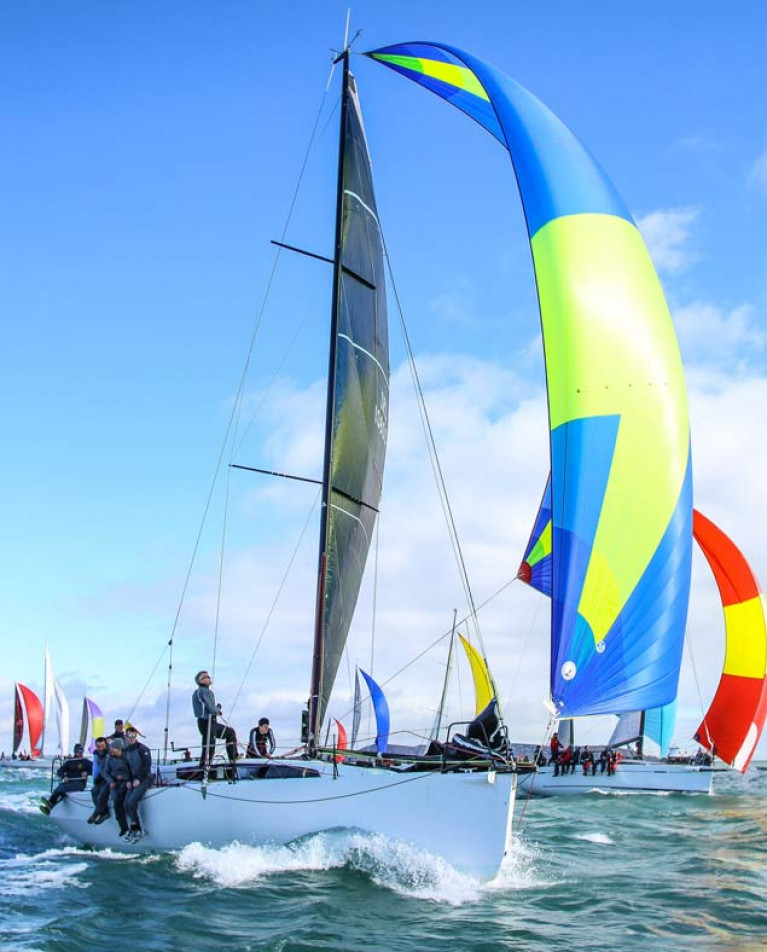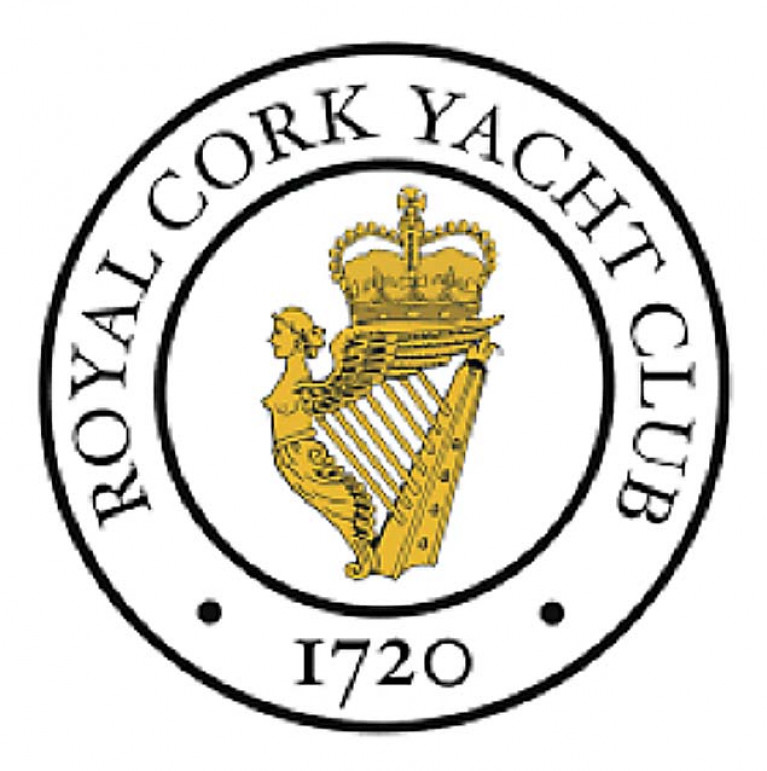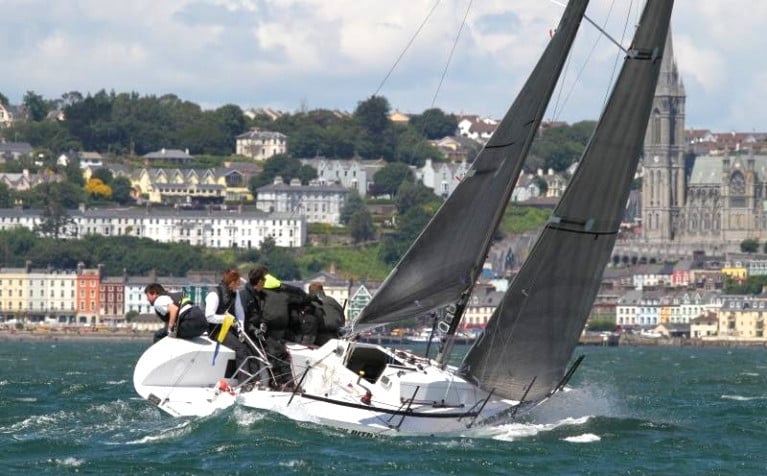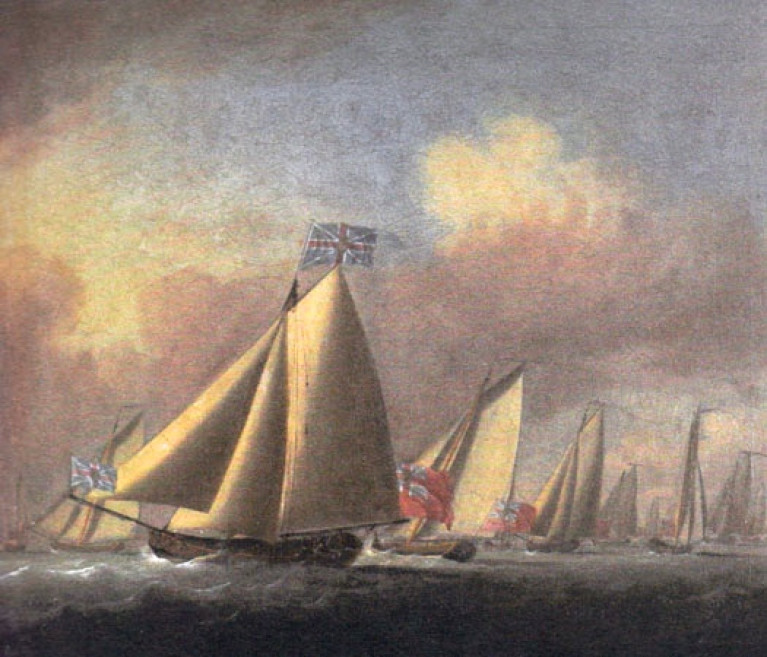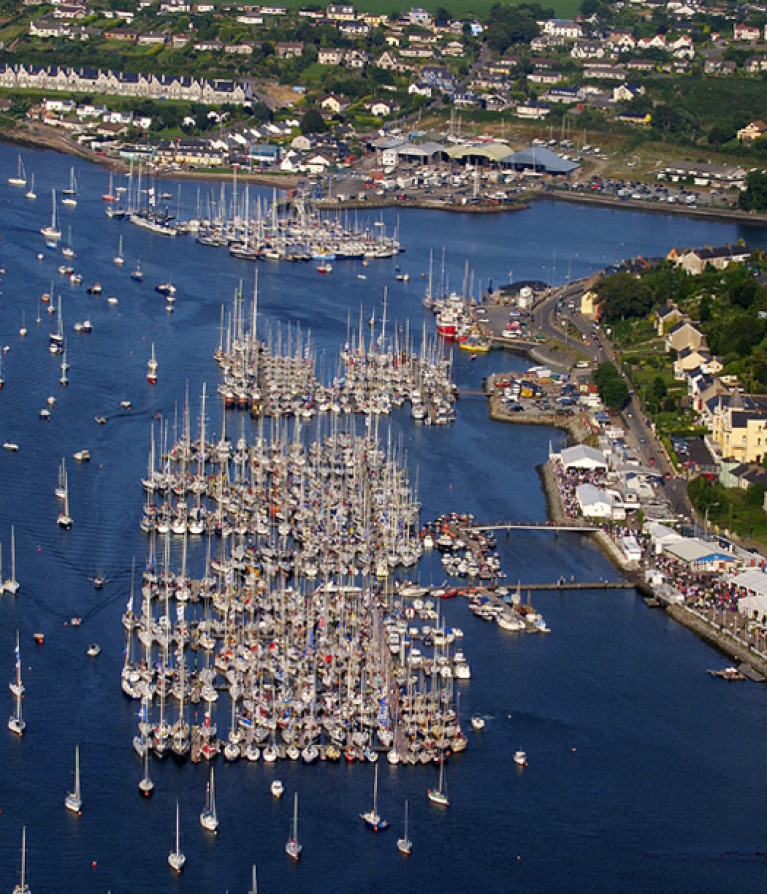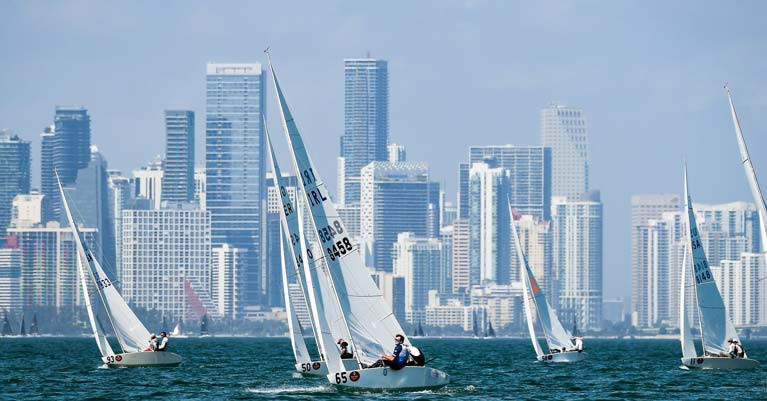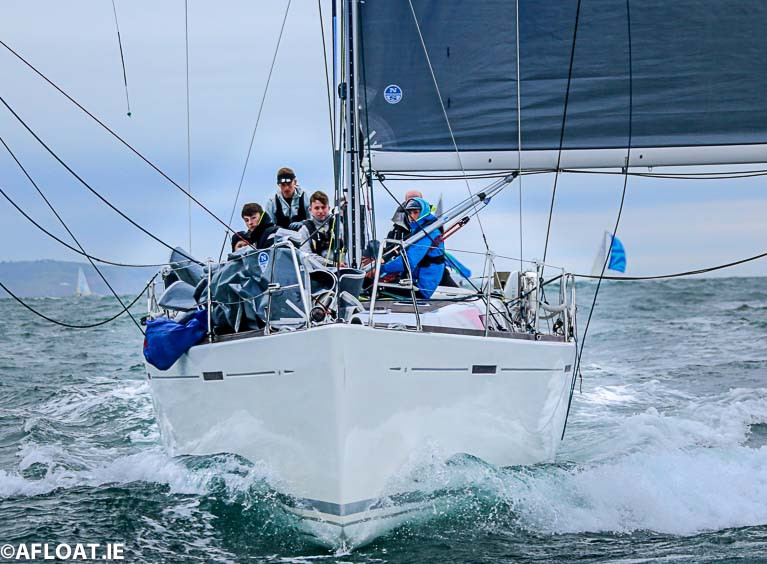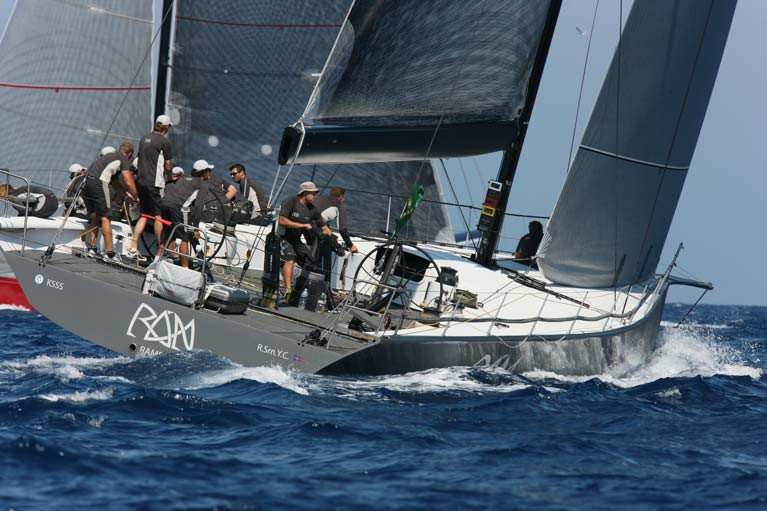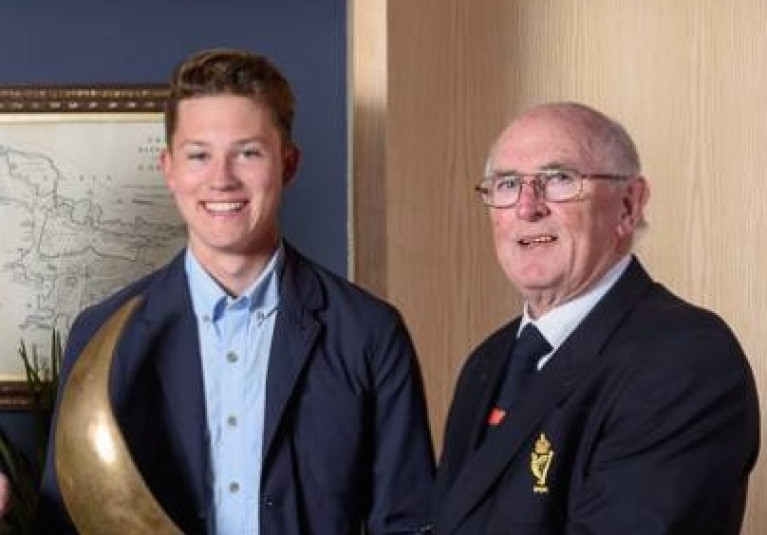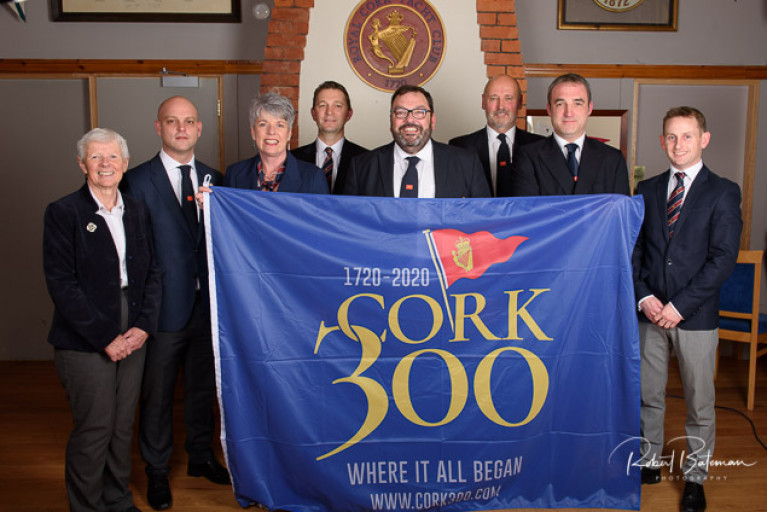Displaying items by tag: Royal Cork Yacht Club
New Date for Dublin Bay-Cork Harbour Race Brings Back Memories of Legendary Schooner America
The postponed date of Friday, July 31st is being considered as a feasible time to think of starting the ISORA-organised 160-mile Dublin Bay to Cork Harbour Race, which was originally planned for July 9th to link this summer’s celebration of the 150th Anniversary of Dun Laoghaire’s National Yacht Club with the massive Tricentenary Celebrations of the Royal Cork Yacht Club.
The COVID-19 lock-down and its aftermath may have wiped out or changed much of 2020’s keenly-anticipated major fixtures, with the SSE Renewables Round Ireland Race on 20th June from Wicklow postponed to August 22nd, while all the main Royal Cork regatta and championship events for July have been cancelled.
But now that the analyses of the disease and its treatment and progress are developing positively on a daily business, it has become a question of “when” rather than “if” on whether or not there can be a meaningful start of the 2020 sailing programme in the best of the summer months, while still adhering to nationwide health guidelines.
A port-to-port offshore race by its very nature involves much less shoreside infrastructure than a major regatta, and Dun Laoghaire’s Peter Ryan of the Irish Sea Offshore Racing Association, a key player in its renewed vitality in recent years, reckons ISORA can thus play a leading role in getting sailing going again, as the Association operates flexibly, and may even offer the slight possibility of a couple of shorter races earlier in July.
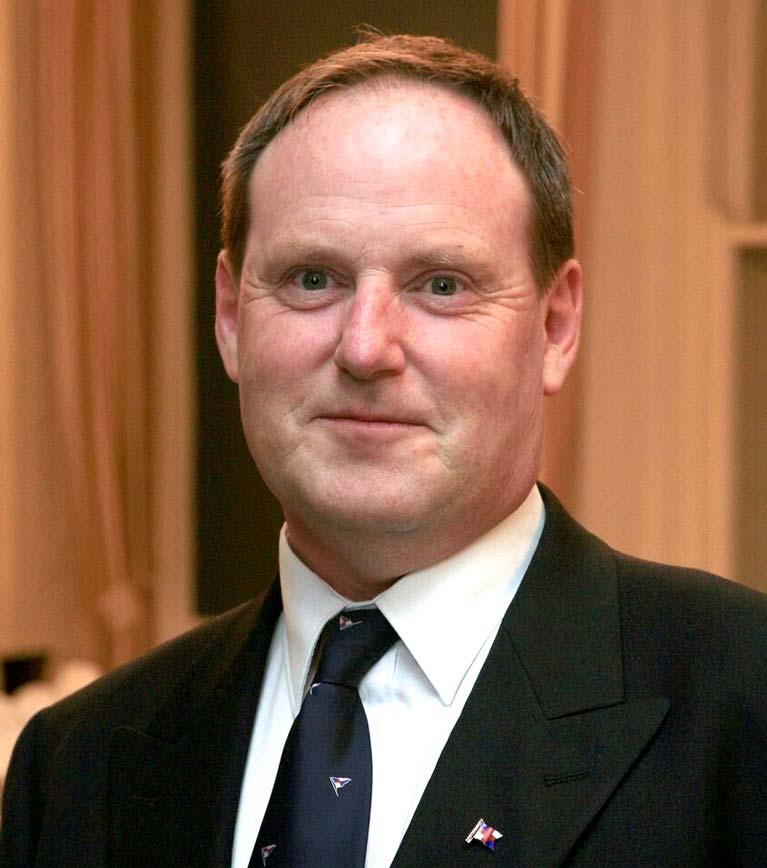 In addition to his successful longtime involvement with ISORA, Peter Ryan was Commodore of the National Yacht Club when it won the Mitsubishi Motors Sailing Club of the Year Award for 2011.
In addition to his successful longtime involvement with ISORA, Peter Ryan was Commodore of the National Yacht Club when it won the Mitsubishi Motors Sailing Club of the Year Award for 2011.
Talking to Sailing on Saturday late this week, while Peter Ryan emphasised that his thoughts were speculative and entirely his own, he reckoned that thinking in terms of starting what would have been ISORA’s big one in 2020, the historic re-sailing of the path-finding 1860 offshore race from Dublin Bay to Cork, could be on the cards by Friday, July 31st.
“It gives a modern connection to such an extraordinarily historic event that running it would cheer everyone up after a period in which we’ve lost so much in so many ways,” says Ryan. “And it would fit in neatly with getting the Irish Sea fleets to Cork to be conveniently on station for the beginning of the four-day Calves Week at Schull on Tuesday, August 4th.
“Then too, it would still leave plenty of time for those who wish to return to the Irish Sea for the Welsh IRC Championship at Pwllheli from August 14th to 16th August. And it would provide a very useful qualifying race for those who need to build up their sea time for the SSE Renewables Round Ireland Race on August 22nd. So everything points to being ready to think in terms of the Dublin Bay to Cork Harbour Race on Friday, July 31st”.
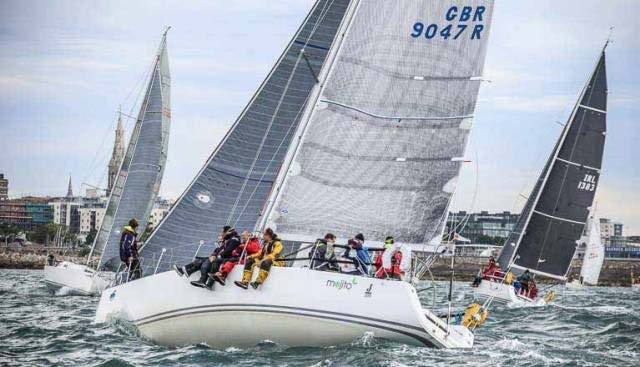 ISORA pre-start manoeuvres off Dun Laoghaire, with the successful Pwllheli-based J/109 Mojito (Peter Dunlop & Vicky Cox) in foreground. With a minimal requirement for shoreside infrastructure and organization, ISORA can be very flexible in modifying its programme. Photo: Afloat.ie/David O’Brien
ISORA pre-start manoeuvres off Dun Laoghaire, with the successful Pwllheli-based J/109 Mojito (Peter Dunlop & Vicky Cox) in foreground. With a minimal requirement for shoreside infrastructure and organization, ISORA can be very flexible in modifying its programme. Photo: Afloat.ie/David O’Brien
This is encouraging stuff, with the reassuring sense of quiet but thoughtful leadership at a time when it’s most needed. That said, the simple basic nature of ISORA’s functioning enables it to be nimble in adapting to changing circumstances. Yet in highlighting the significance of the Dublin Bay to Cork Harbour Race, Ryan definitely is associating his organisation and its revival of the sailing programme with sailing events of exceptional historical significance.
It was June 23rd 1861 when a distinctive 95ft schooner with markedly raked masts slipped into Cork Harbour and came to anchor off Cobh. She’d the look of a vessel which had recently sailed many offshore miles, but her congenial ship’s company were sailing under the burgee of the Royal Victoria Yacht of Ryde on the Isle of Wight, and they flew a well-used British ensign. So despite the absence of a properly-maintained ship’s log, the officials of this naval port accepted the schooner’s bona fides of being on an easygoing family cruise from the Solent to southwest Ireland, and accorded them the privileges which this conferred in terms of the waiving of harbour dues, while the Cobh-based Royal Cork Yacht and Royal Western of Ireland Yacht Clubs both made them welcome.
At the time Cobh – or Queenstown as it then was – was very much the hub of Cork Harbour sailing. For although there was a nascent club across on the western shore at Monkstown, it was 1872 before it became the Royal Munster Yacht Club, while Crosshaven was a tiny fishing port, with one of the few yachts about the place being the Newenham family’s 25-ton cutter Mask, lying to her moorings upriver on the Owenabue River.
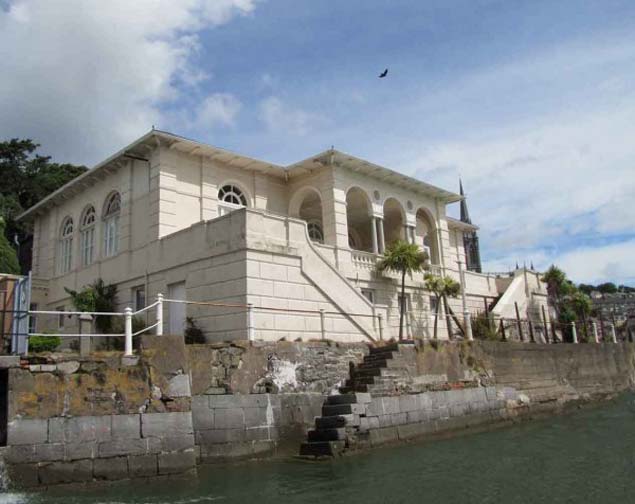 The Sirius Arts Centre in Cobh. Originally the 1854-completed Royal Cork YC clubhouse, it was here that the first Dublin Bay to Cork Harbour Race of 1860 finished, and where the crew of the mysterious schooner Camilla were made welcome on June 23rd 1861.
The Sirius Arts Centre in Cobh. Originally the 1854-completed Royal Cork YC clubhouse, it was here that the first Dublin Bay to Cork Harbour Race of 1860 finished, and where the crew of the mysterious schooner Camilla were made welcome on June 23rd 1861.
But Queenstown was buzzing, for in July 1860 the Royal Cork Yacht Club, under the enthusiastic guidance of its 80-year-old Admiral Thomas G French, had led the way in the inspiration for the first proper offshore race in British and Irish waters. The Royal St George Yacht Club in Dublin Bay had organized a week of regattas in early July, and after they’d concluded, no less than 16 boats – of very varied size and type – had accepted Admiral French’s challenge of racing the 160 miles to Cork, and it started on the 14th July.
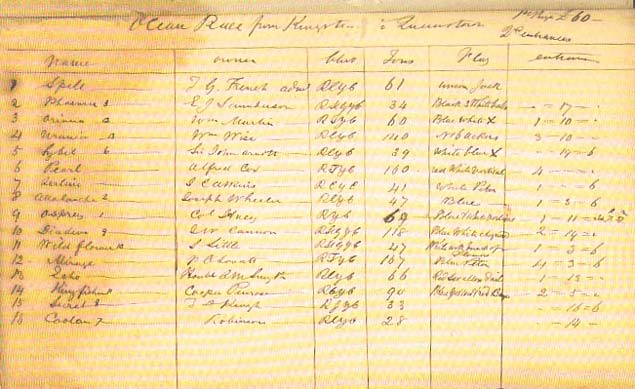 The Entry List for the second race of 1861 was very much an ad hoc affair, with RCYC Admiral Thomas French encouragingly visiting each boat pre-start in Kingstown, and confirming their entry and the fee paid on this list, believed to be written in his own hand. Image courtesy RCYC
The Entry List for the second race of 1861 was very much an ad hoc affair, with RCYC Admiral Thomas French encouragingly visiting each boat pre-start in Kingstown, and confirming their entry and the fee paid on this list, believed to be written in his own hand. Image courtesy RCYC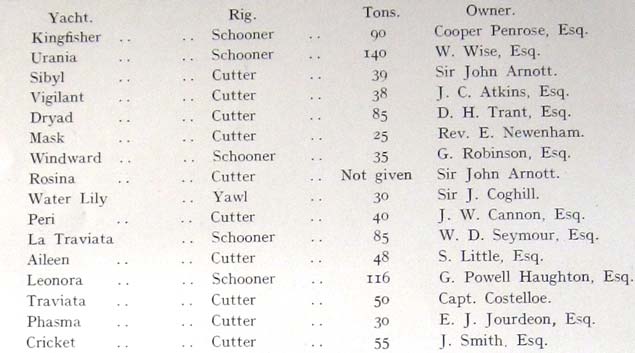 Printed version of the entry list for the first race of 1860 as it appeared in H P F Donegan’s History of Yachting in the South of Ireland, published 1908. Sir John Arnott certainly hedged his bets – he had two entries, and one of them, Sibyl helmed by the amateur Capt. Henry O’Bryen, was the winner
Printed version of the entry list for the first race of 1860 as it appeared in H P F Donegan’s History of Yachting in the South of Ireland, published 1908. Sir John Arnott certainly hedged his bets – he had two entries, and one of them, Sibyl helmed by the amateur Capt. Henry O’Bryen, was the winner
Much of it was raced in rugged windward conditions, but light airs prevailed at the finish off the Cobh waterfront for a real knife-edge conclusion, with Sir John Arnott’s 39-ton cutter Sybil – designed and built on Cork Harbour by Joseph Wheeler of Lower Glanmire – winning line honours and the race by three minutes from J.W.Cannon’s 40-ton cutter Peri, with Cooper Penrose’s 90-ton schooner Kingfisher another two minutes astern of Peri.
Sybil was skippered by the amateur ace Captain Henry O’Bryen, who had reputedly relinquished the helm for a total of only one hour during the race, a triumph for Corinthianism before it had became profitable or popular, if we may mix metaphors for a moment.
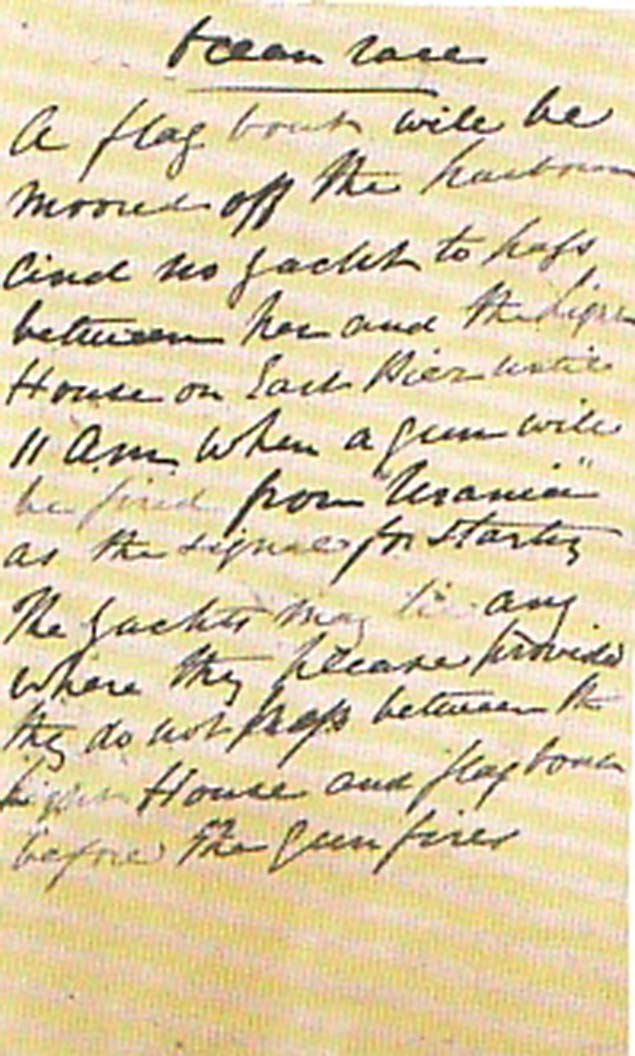 The hand-written Race Instructions for 1860 were also on a “make it up as you go along” basis. It reads: “Ocean Race. A flag boat will be moored off the harbour, and no yacht may pass between her and the Light House on the East Pier until 11 am, when a gun will be fired from “Urania” as the signal for starting. The yachts may lie where they please provided they do not pass between the Light House and flag boat before the gun fires”.
The hand-written Race Instructions for 1860 were also on a “make it up as you go along” basis. It reads: “Ocean Race. A flag boat will be moored off the harbour, and no yacht may pass between her and the Light House on the East Pier until 11 am, when a gun will be fired from “Urania” as the signal for starting. The yachts may lie where they please provided they do not pass between the Light House and flag boat before the gun fires”.
But Sybil’s owner Sir John Arnott (1814-1898) was something else, a real go-getting Scottish-born entrepreneur who’d arrived into Cork in 1837 aged 23 and launched himself into a sometimes rocky commercial career which at various stages involved heavy investment in department stores in Ireland and Scotland, horse racing both as an owner of thoroughbreds and of noted race courses, steamship companies, railways, and for a while the inevitable newspapers, in his case The Northern Whig in Belfast and The Irish Times in Dublin.
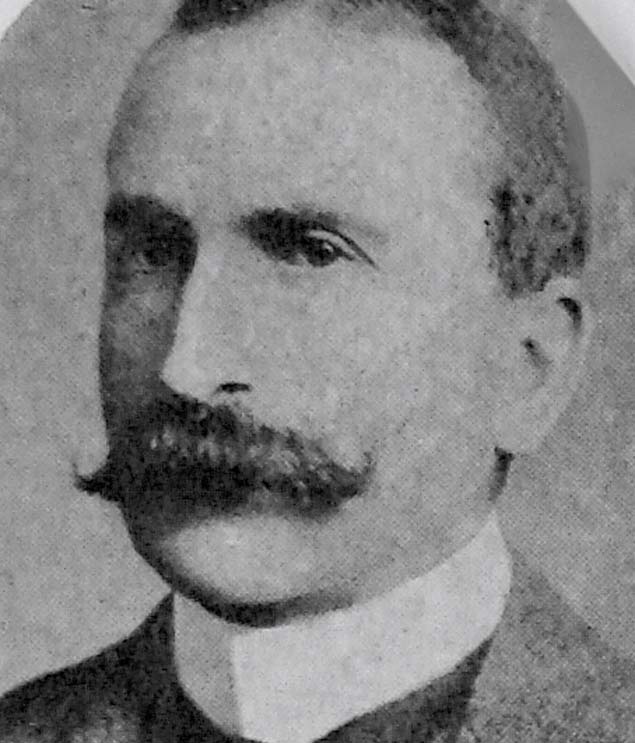 Victorian entrepreneur Sir John Arnott, who had two yachts entered in the first Kingstown to Queenstown Race of 1860
Victorian entrepreneur Sir John Arnott, who had two yachts entered in the first Kingstown to Queenstown Race of 1860
Arnott was always a man in a hurry, so it’s possible that he thought the distinguished flag officers of the Royal Cork were a bit conservative in their management. Thus he was one of a bunch of shaker-uppers who set up a new club in Cobh, the Queenstown Yacht Club, which they cleverly up-graded by taking on the tattered-remains of the old Royal Western of Ireland YC, founded in 1828 in Kilrush by Maurice O’Connell and his nephew Daniel of Derrynane among others, but wandering more or less homeless after the horrors of the Great Famine of 1845-47 had wiped out fripperies like yachting on Ireland’s Atlantic seaboard.
After a vague period in Dublin, suddenly the old Royal Western emerged re-born in 1861 in Cobh with Sir John Arnott as Commodore, and for their first season under this new arrangement, they showed nimbleness of foot by organising - at very short notice - a regatta to provide a race for this strange schooner which had suddenly arrived in their midst.
For although the schooner had the name of Camilla across her shapely transom, the dogs in the street in Queenstown knew that this was the one and only America, the 1851-built New York flyer which, by convincingly winning a rather hastily-assembled race round the Isle of Wight on the final day of Cowes Week 1851, had won a silver cup worth one hundred pounds sterling for her New York Yacht Club syndicate of owners.
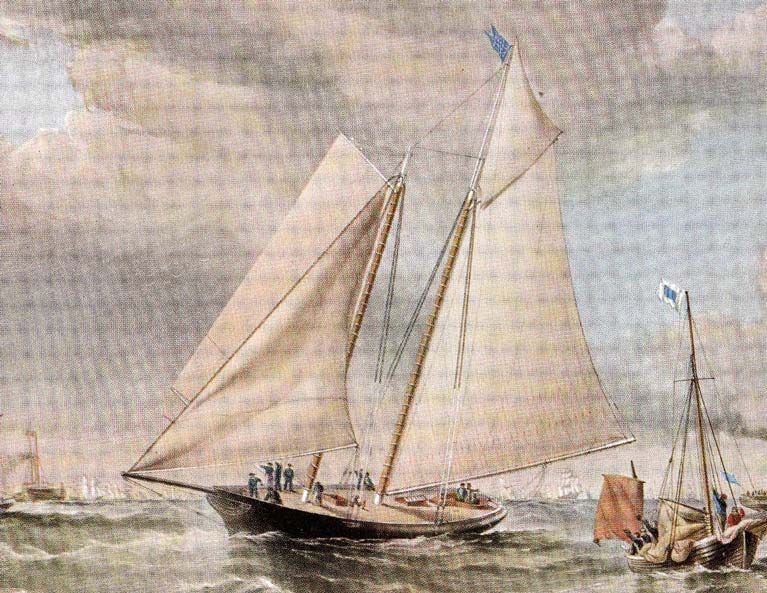 America wins, Friday, August 22nd 1851. Almost everything about her was different, including her notably flat-setting cotton sails, but she was soon being imitated
America wins, Friday, August 22nd 1851. Almost everything about her was different, including her notably flat-setting cotton sails, but she was soon being imitated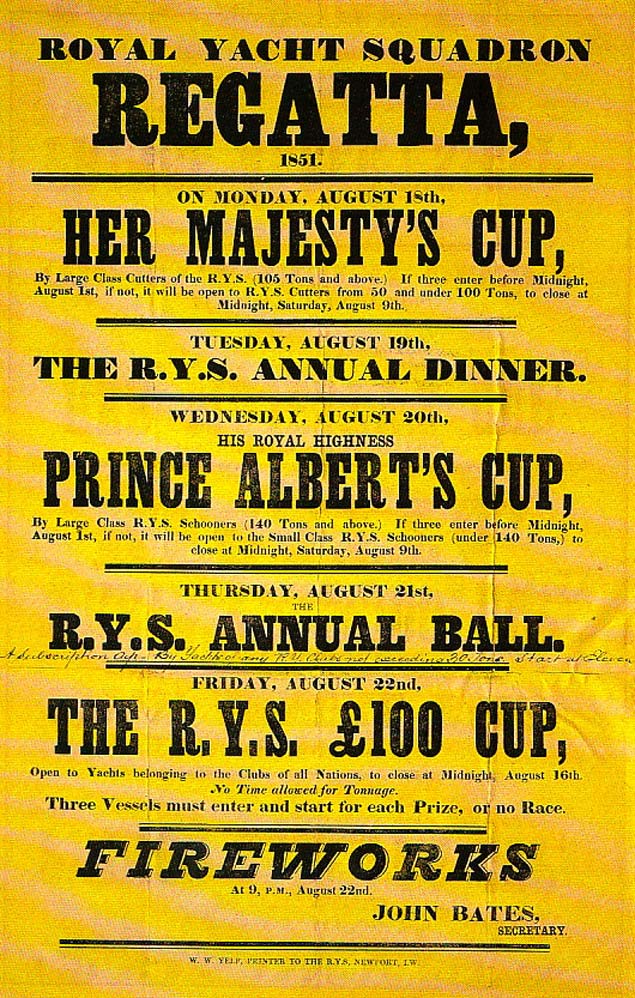 The poster for Cowes Week 1851. The social pace was so hectic that they only had time for three races, and in the notice for Friday 22nd August, the inclusion of “yachts of the Clubs of all nations” was actually aimed at expected entries from the Imperial Yacht Club of St Petersburg in Russia. They failed to arrive, but in the meantime the schooner America had turned up, though she had to wait through the week until she could finally race on the Friday. From these only semi-planned beginnings, there emerged The America’s Cup.
The poster for Cowes Week 1851. The social pace was so hectic that they only had time for three races, and in the notice for Friday 22nd August, the inclusion of “yachts of the Clubs of all nations” was actually aimed at expected entries from the Imperial Yacht Club of St Petersburg in Russia. They failed to arrive, but in the meantime the schooner America had turned up, though she had to wait through the week until she could finally race on the Friday. From these only semi-planned beginnings, there emerged The America’s Cup.
In 1861 when the schooner was briefly in Cork, this rather unlovely cup – ewer is the technical name - was yet to become known as The America’s Cup, and there wasn’t to be a challenge to take it from the Americans until 1870. But ten years after her famous victory round the Isle of Wight, the myth and mystique of the schooner America was well established as part of world sailing lore, and the Young Turks in Cork sailing associated with John Arnott made the most of it, with this special schooner race quickly organised by the Royal Western of Ireland for June 28th, Camilla/America’s opposition being W D Seymour’s 85-ton La Traviata, W Wyse’s 140-ton Urania, and C H Smith’s “little” 66-ton Echo.
Camilla/America’s sails were tired and so were her crew, yet she still managed to take line honours in this slightly mysterious race. But it was by only one minute from the much-smaller La Traviata, which had been amateur-helmed by W D Seymour’s son to a clear handicap victory. After the finish, young Seymour was borne ashore shoulder-high by the cheering waterfront crowds to achieve a Cork Harbour sailing and sporting eminence to match that of Henry O’Bryen who – in a shrewd bit of window-dressing worthy of Arnott’s at their best - had been drafted in as Vice Commodore of the Royal Western of Ireland.
However, all these seemingly-rebellious Young Turks in the re-born RWIYC had retained their membership of the Royal Cork YC and would in time become part of its establishment lineup. But if they’d hoped to promote their “new” club by persuading the Camilla/America to take part in 1861’s staging of the Kingstown to Queenstown Race, they were disappointed, for as we shall see, the famous schooner had serious business elsewhere, and was soon gone.
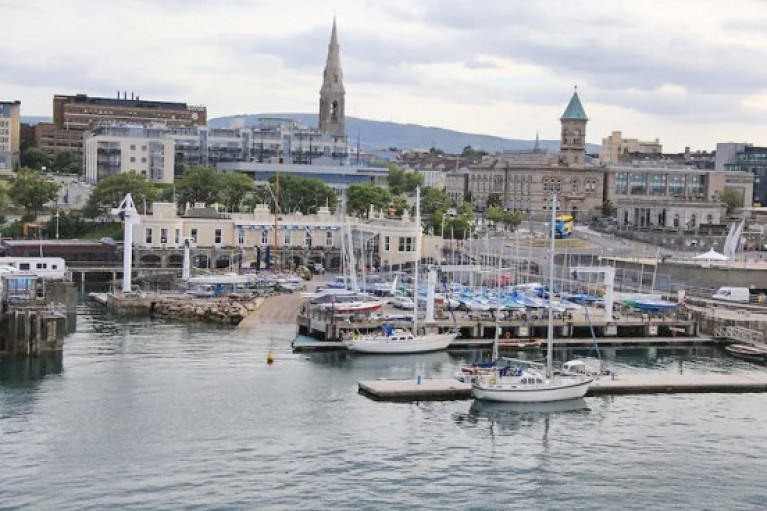 The Royal St George Yacht Club hosted the start of the first Dublin Bay to Cork Harbour race in 1860. Photo: Afloat.ie/David O’Brien
The Royal St George Yacht Club hosted the start of the first Dublin Bay to Cork Harbour race in 1860. Photo: Afloat.ie/David O’Brien
As it is, the 1861 race was started in Dublin Bay on 19th July, and once again mustered 16 starters with the winner being Colonel Huey’s slippy 62-ton cutter Osprey, with designer-builder Joseph Wheeler’s own 48-tonner Avalanche having to make do with second despite having led into Cork Harbour in light airs, while E J Saunderson of Lough Erne YC was third with another even smaller and slippy craft, the 34-ton cutter Phasma.
Admiral French’s own 61-ton yawl Spell took part this time (see first name on written entry list above), but although he was to continue as RCYC Admiral until his death in 1866, he’d already been 77 when he took over as Admiral in 1857, and his enthusiastic promotion of the Kingstown-Queenstown race’s first staging in 1860 suggested an old man in a hurry to promote an idea which he’d been carrying for some time.
Certainly, at its third staging on July 11th 1862, there’s a clear impression that others had taken it over, as the host club on Dublin Bay has become the Royal Irish YC from their impressive 1851-completed clubhouse, while the trophy is an expensive bit of silver plate presented by the Royal Western YC.
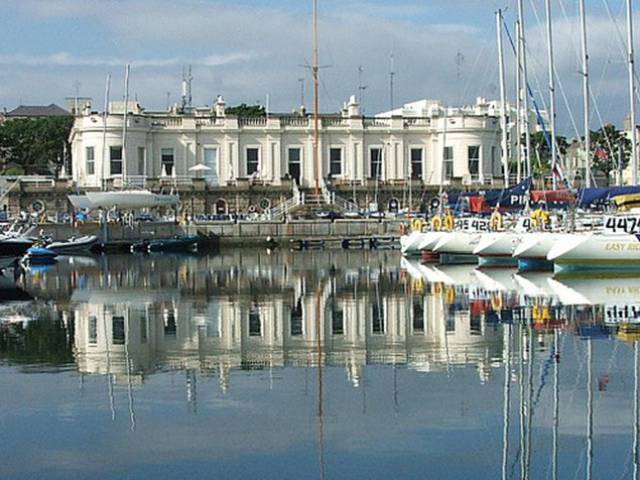 The Royal Irish Yacht Club hosted the start of the third and final Kingstown to Queenstown Race in 1862
The Royal Irish Yacht Club hosted the start of the third and final Kingstown to Queenstown Race in 1862
For anyone seeking abstruse historical connections, it’s of interest that The Liberator, Daniel O’Connell of Derrynane (1775-1847) had been present at both the foundation of the Royal Western in Kilrush in 1828, and the meeting in Dublin on July 4th 1846 when the 1831-founded Royal Irish YC had been revived. Meanwhile, in 1862, the Kingstown-Queenstown Race once again attracted 16 starters (though there’s no note of any entry limit), and they ranged in size from three 35-ton cutters – Ariadne (G Higgins), Coolan (G Robinson) and Glance (A Duncan – to two 130-ton schooner, Galatea (T Broadwood) and Georgiana (Capt Smith Barry).
The clear winner was the 50-ton cutter Phosphorous owned by W Turner - who is doubtless immortalized in modern Cork by Turner’s Cross - while C J Tennant’s 90-ton cutter Clutha was second on the water, but Galatea won the schooners and was reckoned second on handicap.
They arrived into the finish at Cobh where the Royal Western of Ireland was now well-established as the second club with premises at Westbourne Place next the Queen’s Hotel, and a membership which by 1863 included the Lord Lieutenant, Lord Carlisle, as well as Sir Robert Peel, at that time Chief Secretary for Ireland. So heaven only knows what politicking was going on behind the scenes, for the Royal Cork, still with T G French as Admiral, had been well settled into its purpose-designed new clubhouse (now the Sirius Arts Centre in Cobh) since 1854, and no-one doubted its claim of seniority in its descent from the Water Club of 1720.
As it happened, 1863 was probably the high point of the RWIYC’s time in Cobh, for the rest of the decade saw a period of economic decline, and the Dublin Bay to Cork Harbour Race wasn’t staged again. While the Royal Cork came through the thin times as it had come through many others, in 1870 the Royal Western of Ireland YC was quietly wound up at Cobh. But in the west of Ireland, and particularly with the Glynn family of Kilrush and The Knight of Glin across the Shannon Estuary, enough of its memorabilia, artefacts and records survived for it to be revived with the opening of Kilrush Marina, with the club’s greatest modern success being Ger O’Rourke’s overall victory with the Cookson 50 Chieftain in the RORC Rolex Fastnet Race 2007.
This may all seem to be something of an impenetrable maze of history, but it’s perfectly straightforward by comparison with the story of the schooner America, and how she came to be in Cork.
Everyone knows that she was hurriedly built early in 1851 in New York by Brown’s Shipyard, to the designs of the 31-year-old George Steers, for a swashbuckling syndicate of New York Yacht Club members led by John Cox Stevens. The project was to send a challenger across the Atlantic to race the English in Cowes Week at a time when the Great Exhibition in London was signalling the global achievements of the British Empire and its worldwide commercial success and dominance.
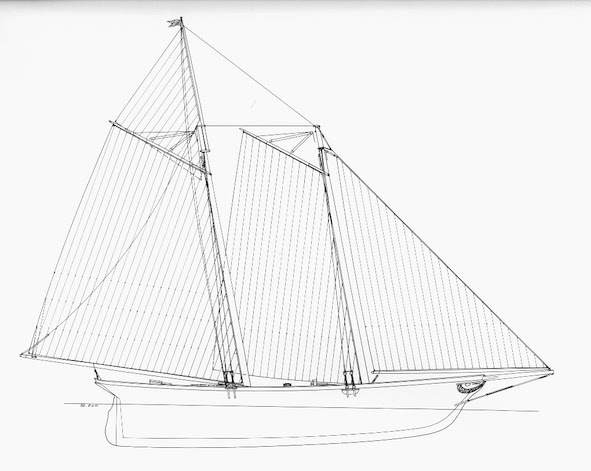 America as she was rigged when she won on August 22nd 1851. The boom on the jib broke during the race, which lost her about 15 minutes in repairs, but she was still well ahead at the finish.
America as she was rigged when she won on August 22nd 1851. The boom on the jib broke during the race, which lost her about 15 minutes in repairs, but she was still well ahead at the finish.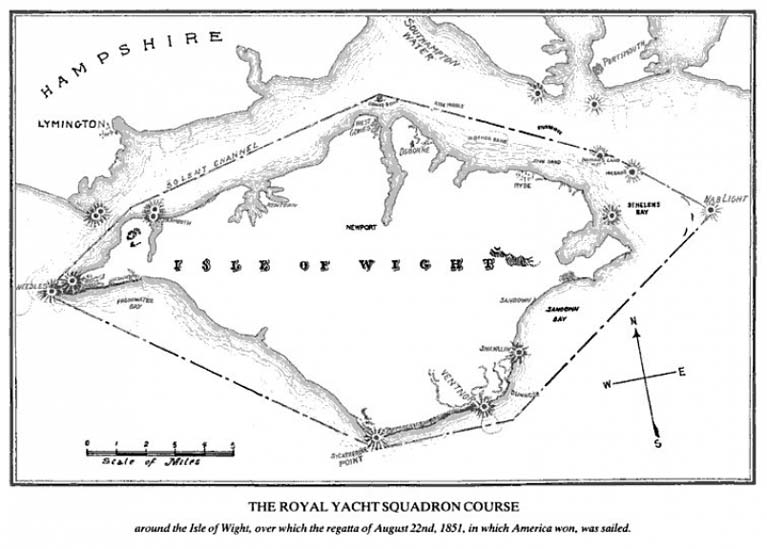 The 57-mile course for August 22nd 1851 – the Isle of Wight was rounded clockwise
The 57-mile course for August 22nd 1851 – the Isle of Wight was rounded clockwise
Not one of the top British racing yachts looked remotely like America, with her low rig and its raked masts, and her extremely hollow waterlines forward. But after she’d made her mark in a very distinctive fashion in just one race round the Isle of Wight on Friday, August 22nd 1851, several English racers were very expensively altered to take on board some of her ideas.
As for her American owners, they were gamblers to a man, so they collected their winnings, and celebrated mightily in New York, supported by their fellow-citizens to such an extent that grinchy Manhattan lawyer George Templeton Strong confided to his diary: “Newspapers crowing over the victory of Stevens’s yacht, which has beaten everything in the British seas. Quite creditable to Yankee shipbuilding, certainly, but not worth the intolerable, vainglorious vaporings that make every newspaper I take up now ridiculous. One would think yacht building were the end of man’s existence on earth”.
Quite so. Henry James would have been pleased with that. But as for America’s owners, they dropped ideas of sailing her home, and sold her in the Solent for 25,000 dollars to an Irish army officer of French Huguenot extraction, John de Blaquiere, who was soon to become the fourth Baron de Blaquiere of Ardkill in County Derry, where the family had thousands of acres acquired through their skills in tax gathering for the government, while the title came from supporting the Act of Union in 1801.
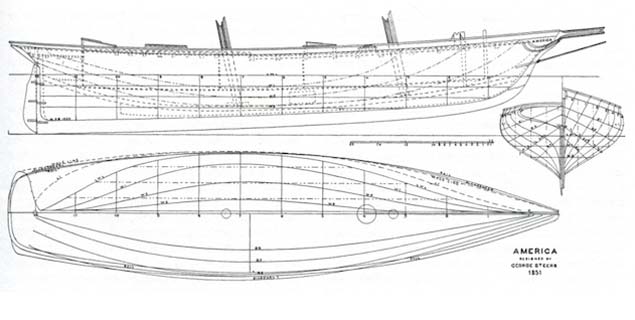 An amazingly well-balanced hull, with a rudder more like a trim tab. In her original form, America was steered by a small tiller, and the fact that her rudder stock had a very small rake forward may have helped her lightness of helm
An amazingly well-balanced hull, with a rudder more like a trim tab. In her original form, America was steered by a small tiller, and the fact that her rudder stock had a very small rake forward may have helped her lightness of helm
Despite these links, de Blaquiere never brought America to Ireland, but did some remarkable cruising to the Mediterranean, with the famous racing boat demonstrating her seagoing credentials by coming through a very severe storm off Malta in February 1852, while her legendary lightness of helm was eulogised by an experienced guest sailor: “Many yachtsmen will remember the almost mop-handle diminutiveness of her tiller, I steered her when going seven knots close-hauled and in some Bay of Naples swell, standing to leeward of the tiller and pressing against it with my little finger only”.
America’s hull was so sweetly balanced that her slim rudder was little more than a trim tab, but it was a trim tab made as effective as possible by being so vertical that the stock is almost inclined forward, unlike the unhealthy measurement-rule induced rudders of a later era, with their excessive and inefficient aft-raking of the stock.
Yet with all her virtues, as John Rousmaniere has commented in “The Low Black Schooner”, his brilliantly succinct account of this remarkable vessel, in the mid-1850s: “America was neglected because she had succeeded to the ambiguous status that is reserved for all trend-setters past their time.” However, in 1856 she was bought by yet another Irish peer from the north, this time Lord Templeton whose lands were in County Antrim, but he never brought America to Ireland either. In fact, he scarcely used her, though he did re-name her Camilla, and it was under this name that she was sold to ship-builder Henry Pitcher, who did extensive re-build work at his yard on the Thames.
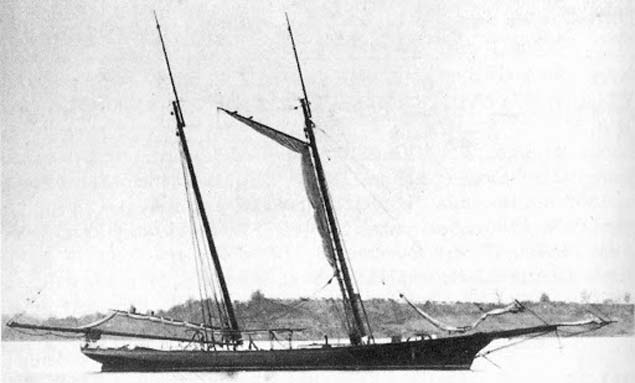 America’s rig underwent various forms in later life, and at one stage she had topmasts on both the main and fore masts, with the mainsail and the boomless foresail brailed up to their gaffs, the foresail’s gaff boom being left aloft. A retractable addition was also fitted to the bowsprit.
America’s rig underwent various forms in later life, and at one stage she had topmasts on both the main and fore masts, with the mainsail and the boomless foresail brailed up to their gaffs, the foresail’s gaff boom being left aloft. A retractable addition was also fitted to the bowsprit.
He then sold her in 1860 to a “mysterious character” called Henry Edward Decie, supposedly a 28-year-old former officer in the Royal Navy, where they’d been obliged to let him go, as they say in HR circles, because he’d been excessively zealous in chasing pirates on the coast of South America, and had knocked lumps out of a Brazilian warship by mistake.
Maybe so. At least that was his story, but we’re into murky waters here, and things were becoming even murkier in the USA with the Civil War looming. A dodgy character like Decie with a super-fast boat like Camilla ex-America - with her proven transatlantic capacity - was just what the Confederate States were looking for in assembling a fleet of fast blockade runners.
Henry Decie seems to have been Captain Cool, and he certainly loved sailing. Family cruising too. In August 1860, having won a race in a regatta at Plymouth, Camilla sailed away with Henry Decie and his wife or maybe she was his mistress and her six children and a crew of thirteen (nothing superstitious about our Henry), and after calling at several places including Lisbon and the Cape Verde Islands, on April 21st 1861 she fetched up on the other side of the Atlantic at Savannah, Georgia. There, the rebel Confederate Government had her bought within a month for 60,000 dollars on condition that Decie remained in charge, and undertook a voyage to Europe with a mission to purchase armaments and organize the building of warships.
So the former schooner America set off back to Europe still under the command of Henry Decie on the 25th May 1861 for her third Atlantic crossing, and on board with Decie and his shipmates were two Confederate Agents with Bills of Exchange to the tune of 600,000 dollars, plus Letters of Credit for much more. This was serious stuff. Yet on June 23rd it was as a light-hearted cruising vessel that she arrived into Cork Harbour, claiming the immunity and privileges conferred by her Royal Victoria Yacht Club burgee and British ensign, with Decie saying that he’d just strolled over from Cowes for a little competition.
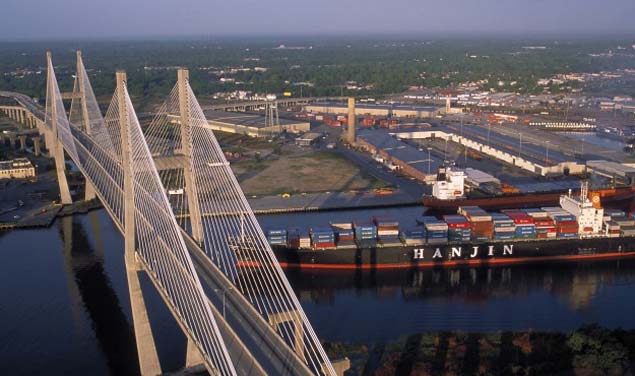 The modern port of Savannah in Georgia, USA. The schooner Camilla ex-America departed Transatlantic from here on 25th May 1861, but when she arrived in Cork Harbour on June 23rd, her skipper Henry Decie claimed they’d just sailed over from Cowes.
The modern port of Savannah in Georgia, USA. The schooner Camilla ex-America departed Transatlantic from here on 25th May 1861, but when she arrived in Cork Harbour on June 23rd, her skipper Henry Decie claimed they’d just sailed over from Cowes.
That was duly arranged in jig time by the Royal Western Yacht Club of Ireland in Cobh. We can only guess as to who really knew what was going on. The two Confederate agents soon disappeared into the bustle ashore and onward on their mission, and Henry Decie and the Cork Harbour schooners went yachting, but then he had to depart again within a day or to rendezvous with the agents.
In time, Camilla reverted to being America, and she finished the Civil War serving on the Union side. In various ownerships and eventually, in the charge of the US Navy, she survived until 1945. But the 100,000 dollars which President Franklin D Roosevelt had allocated for the maintenance of the old girl never reached her in the hectic end-of-war period, and in 1945 the roof of the shed she was housed in collapsed under a freak fall of snow, and that was the end of the wonderboat of 1851 which had briefly been a sensation when she sailed into Cork Harbour in 1861.
The Royal Cork Yacht Club has been sailing on Cork Harbour for the past 300 years and while boats and their crews are currently unable to take to the wonderful waters of Cork Harbour due to COVID-19 a little plan was hatched by the RCYC Keelboat Committee to bring the Keelboat Racing online and host the first Keelboats Digital Virtual Regatta.
Nigel Young of North Sails Ireland kindly came aboard to sponsor the inaugural RCYC Keelboats North Sails April Digital Virtual Regatta which will formally commence on Thursday the 9th of April and run for four weeks. Last night, in advance of the league commencing, a series of one practice race followed by six races was hosted and sponsored by North Sails to allow sailors to get used to the online system.
Commenting on the evenings racing Nigel Young says “In these uncertain times we find ourselves in North Sails are delighted to support initiatives like this that keep our sport alive. Not only that, but it was also great to see my family fully engaged in that online fun. I think what the results show is that some of the club's top sailors spend too much time playing computer games”
Using the app Virtual Regatta Inshore ® 20 of RCYC Keelboat members logged onto the racecourse from the comfort of our own homes and lined up on the start line. The boat for the evening was to be “Day Sailor” which are very similar to j70s with windward-leeward courses to be sailed for the evening.
The evening’s race schedule was to mirror that of the upcoming league commencing on the 9th of April with one practice race followed by six races with discards every 6th Race. The regatta was hosted by the Rear-Admiral of Keelboats Daragh Connolly and communication was done via a WhatsApp group. VHFs were also used by some of the racers to add to the occasion. It is rumoured, however, this remains unproven to date, that Donal Hegarty, who was at the helm of Azar for the evening, was fully geared up at home with Oilskins and buoyancy aid being worn for the duration of the races.
From the first gun of the practice race, it was clear that there was a mix of sailors with a number of very competitive sailors (well used to the online platform) and a few new entrants to the online sailing world. Racing was very close all over the course with meters separating the boats. Tom McGrath proved Nigel Young’s earlier comments correct by showing everyone his stern for the race and taking line honours with comfort in the practice race.
Race one began with a strong start from Killian Collins on ‘Red Shift’ followed by Cian Jones on ‘JellyBaby2’ and Daragh Connolly taking 3rd on ‘Yanks $ ffrancs’. In race two, JellyBaby 2 took line honours followed closely by James Young with Tom McGrath completing the podium. The following four races were very close battles with the competitive spirit coming out in all. Sailors came ashore and it was quickly clear that Killian Collins’ 4 first places on the night make him the one to watch as he won the evening with only 10 points. Donal Hegarty’s ‘Azar’ was in second place with 15 points and Cian Jones on ‘Jellybaby2’ was third on 19 points. There was a strong number of spectators watching the racing which added to the spirit of the event and made it a great evening for both the spectators and the racers.
Next Thursday night will see the start of the RCYC Keelboats North Sails April Digital Virtual Regatta which will run from Thursday 9th April to 30th April. You can log on and watch the racing live with the first gun being 20.00hrs for the practice races, followed by first six races of the league.
Results can be viewed here
Cork Week 2022: Royal Cork Yacht Club Sets the July Date
Cork Week 2022 will take place July 11 to 15, 2022 at the Royal Cork Yacht Club in Cork Harbour.
The new dates were released by RCYC Admiral Colin Morehead after the world's oldest yacht club was forced to cancel its 300th celebrations planned for July 2020 in the face of the Coronavirus pandemic.
Read all Afloat's Cork Week stories here
Irish Sailing Life in the Time of Suspended Animation
The Covid-19-related cancellation of the pillar events planned for July in the Royal Cork Yacht Club’s Tricentenary Celebrations has had an inexorable inevitability about it for the last ten days and more.
But a decision of such magnitude needed to be allowed a reasonable time for its scale and significance to be fully appreciated before the momentous announcement was actually made. While there is an understandable numbness at realising that it should have come to this, there is no doubting that the right decision has been arrived at in a timely manner.
It is a reminder, too, that important and all as the 300th Anniversary of such a remarkable organisation had become in the global context, in the final analysis, it was only another number in an extraordinary succession of annual numbers during which, through times good and bad, the unique sailing spirit of Cork has been kept alive and thriving. So much so, in fact, that today in Crosshaven we look at a modern sailing club which happens to have a very special and unprecedentedly long history which it has faithfully recorded over the centuries in its art and memorabilia, its historical artefacts, its magnum opus of a history published in 2005, and the ever-contemporary sailing enthusiasm of its members.
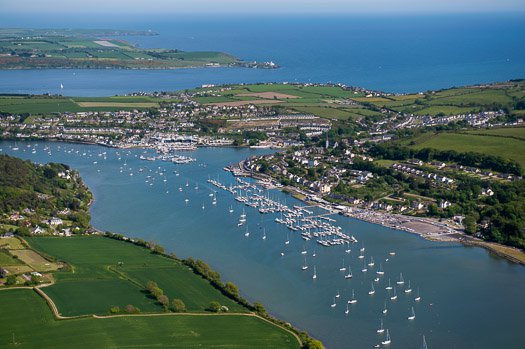 The Royal Cork Yacht Club’s base at Crosshaven, which combines all the facilities of a modern sailing club with an unrivalled history of the development of the sport. Photo: Robert Bateman
The Royal Cork Yacht Club’s base at Crosshaven, which combines all the facilities of a modern sailing club with an unrivalled history of the development of the sport. Photo: Robert Bateman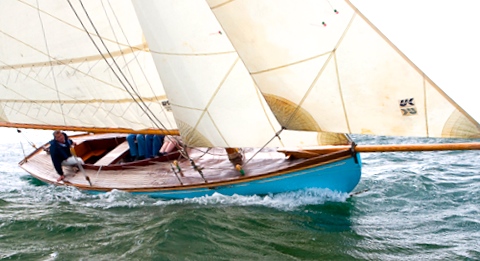 The restored Cork Harbour One Design Elsie is living history, which in this case dates back to 1895. Photo: Robert Bateman
The restored Cork Harbour One Design Elsie is living history, which in this case dates back to 1895. Photo: Robert Bateman
The thoughts of sailors everywhere and particularly in Ireland will be with them this weekend. And as it is, this weekend will test us as we’ve never really been tested before in the current crisis and its tragedies. The weather is good, and the clocks are going forward to emphasise the rapid progress of spring. While the statistics of illness are daunting and rising rapidly, most of us feel well – we feel very well indeed. Yet in every hoped-for aspect of a typical Irish weekend on the threshold of April – whether it be in sporting, cultural, social, family or just plain everyday life – we are going to be frustrated.
We are going to be frustrated in simply letting off energy or keeping ourselves happily absorbed in our many interests, however odd they may seem to others. And for sailors, our frustration is compounded by the fact that the prospects and planned programme for the summer of 2020 – which in Irish sailing, in particular, were promising to produce the greatest and most historic season ever – are either going to be severely postponed, put on hold, or simply not staged at all.
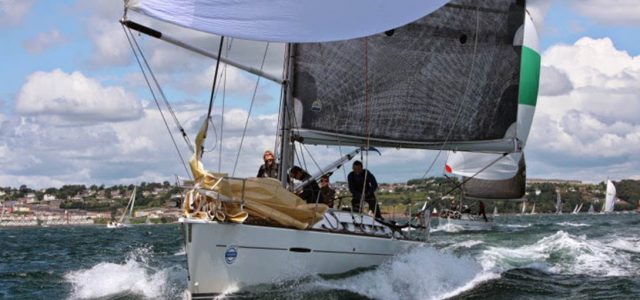 The release of pent up energy with the sailing season in full swing is central to Cork Week
The release of pent up energy with the sailing season in full swing is central to Cork Week
Naturally our first thoughts - indeed nearly all our thoughts - are firmly and sincerely with those who are in the front line of battle against this disease plague. Yet in our highly-structured but normally tolerant and civilised society, in the lock-down situation which now obtains the best that most of us can do to help the situation is to allow the health professionals the space, time, and moral support to get on with their vital jobs.
As for those whose task it has been to decide on the major cancellations, our thoughts are also very much with you. We can only dimly imagine the pain this has caused. The rest of us meanwhile have to somehow get on with living our lives and fulfilling our interests as best we can, in ways which somehow take account of what is effectively the cancellation of the main part of the 2020 sailing programme. We do this while complying with health and safety directives on behaviour and social distancing and – if need be – self-isolation, while somehow burning off or absorbing that extra energy which becomes so abundantly evident at this time of year.
So far, as the crisis has developed, our society in almost all its aspects has dealt well with a situation in which day-to-day life has been changing with mind-boggling rapidity. Yet in sport in general and in sailing in particular, we must be aware of the new problems brought by the accelerated change from long winter nights, with their natural restriction on outdoor and waterborne activity.
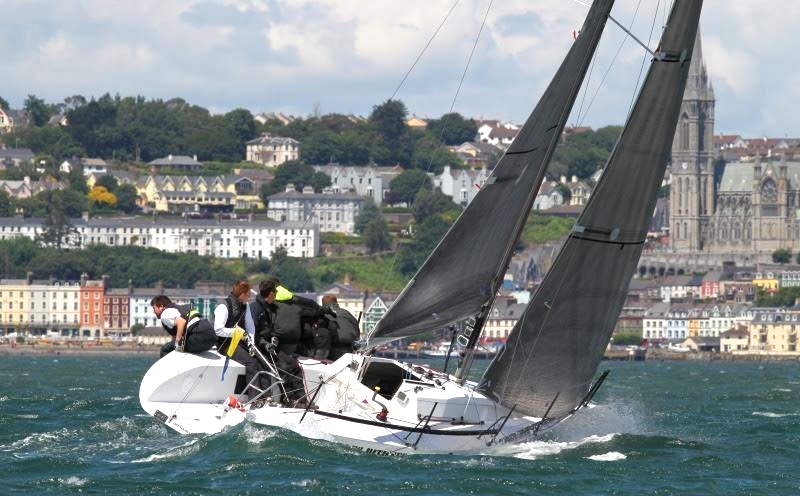 Cork Harbour racing against the distinctive background of Cobh
Cork Harbour racing against the distinctive background of Cobh
By Sunday with the clocks changed, we are into the time of evenings of springtime and early summer when each day’s daylight is clearly sensed as longer than its predecessor, and people’s restless desire to go sailing grows ever stronger. Under present regulations, it is possible to get afloat while remaining compliant, but it will be sailing in a very narrow and defined way, a whole world away from the traditional convivial boat world of sport afloat and lively sociability ashore.
With annual lift-ins now postponed at many clubs, the opportunities to go sailing in keelboats are obviously only available to those who can access boats which have wintered afloat. While many will do this when possible, it will be done in a muted way for the very human reason that it somehow doesn’t seem quite fair to enjoy sailing when so many others are deprived of it.
In time, the immediate crisis will end, though some of its longterm effects could be permanent. But as of this weekend in particular, when the time of crisis conclusion is anybody’s guess. Yet while the heroic health professionals are absorbed in their struggle, it is surely vitally important for the rest of society to be at least partially pre-occupied by the reassurance that some semblance of normality will return in due course, and in order to keep ourselves even half sane, we must be allowed to think of a future when Covid-19 no longer dominates every waking moment.
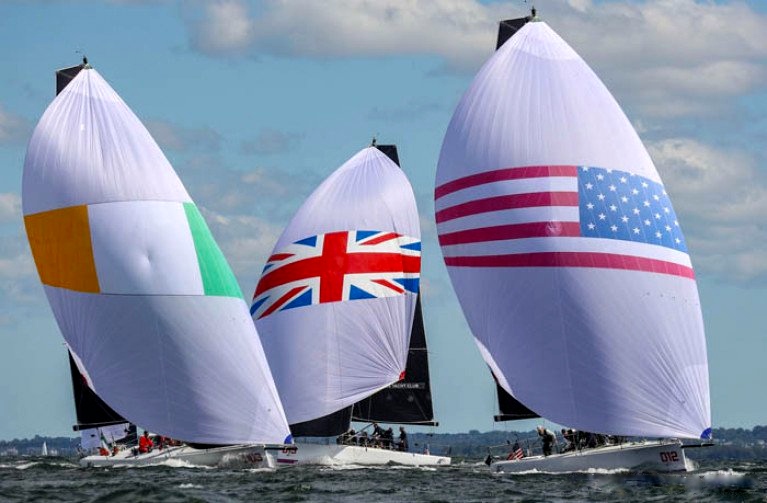 Royal Cork goes international. Anthony O’Leary for Ireland and the Royal Cork challenging the UK and the US in the New York YC Invitational at Newport, Rhode Island last September, when they won Bronze. The racing is in the new IC37 designed by Mark Mills of County Wicklow, who this month was declared winner of the MDO Montecarlo Design Trophy
Royal Cork goes international. Anthony O’Leary for Ireland and the Royal Cork challenging the UK and the US in the New York YC Invitational at Newport, Rhode Island last September, when they won Bronze. The racing is in the new IC37 designed by Mark Mills of County Wicklow, who this month was declared winner of the MDO Montecarlo Design Trophy
But how do you fit day-to-day life with a Fast Forward control? Let us fantasise for a while, as that in itself helps to pass the time. For even as this morning’s virtual column spins into cyberspace, our team of top scientists in Sailing on Saturday’s Einstein Research & Development Laboratory is working day and night on how best to shift the entire Irish sailing community at least four months forward through the curves of time and space to a day when Covid-19 has been safely moved into becoming history, and something resembling our normal summer sailing is at least showing little green shoots of recovery.
For although re-growth may well be a slow progress with small green shoots playing a prominent role, the sudden gaps, stops, postponements and cancellations for what had promised to be the greatest sailing season ever in Ireland have been like mighty oaks crashing down in the forest. The forest itself may remain, and in time some nighty oaks will assert themselves as pillars of the programme. But for the moment with what is effectively national lock-down, there’s inevitably some flailing around in working out how best to cope with re-aligning the season.
The Global Programme Pecking Order soon asserts itself. The Olympics may have dithered about when and how to change. For what it’s worth, my own feeling was that a move from July to October might have been a viable solution, particularly remembering that when Irish sailing first got involved in a Tokyo Olympics in 1964, the entire programme was in late October when conditions in Tokyo are much less oppressively humid.
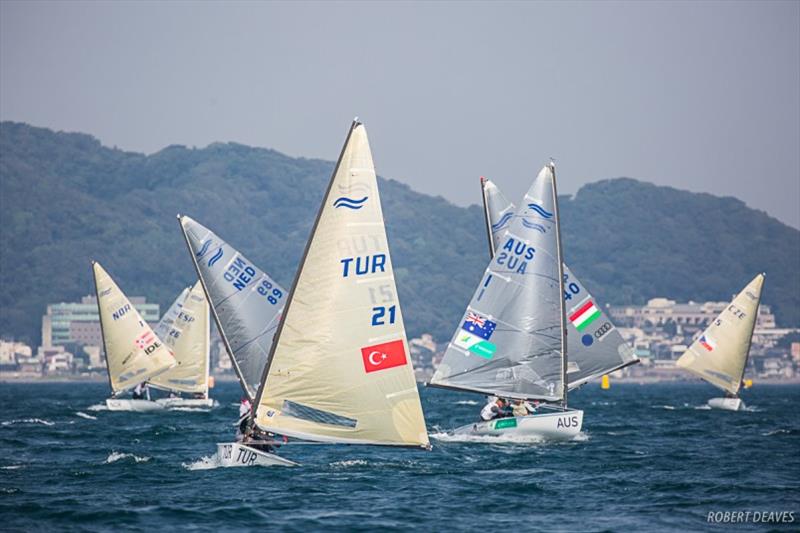 The International Finns at the Olympic Regatta site at Enoshima in Japan. The 2020 Olympics would have been the Finn Class’s last Olympics, but the Covid-19 Olympic delay to 2021 has given them an extra year’s stay of execution
The International Finns at the Olympic Regatta site at Enoshima in Japan. The 2020 Olympics would have been the Finn Class’s last Olympics, but the Covid-19 Olympic delay to 2021 has given them an extra year’s stay of execution
But whatever your own feelings, there’s no escaping the Olympic’s pinnacle position at the top of the international sports food chain, and when they finally decided to shift it all into the future by twelve clear months, everything else in the big league has to adjust accordingly.
However, compact events with a local flavour can be more nimble in their movements. The organizing committee for the three day Wave Regatta at Howth at the end of May were incisive in their early decision to shift from May to mid-September, and now with the big-fleet Round the Island Race in the south of England given the same time treatment, we can only hope that September 2020 is a time of benevolent Indian summer.
In trying to get a perspective on what it all means, we’ve been thinking back to other years when external events significantly changed our sailing way of life. It took world wars to remind people of how the freedom to go sailing as you wished was the very essence of peacetime, and in World War I from 1914-1918, some Irish sailing continued determinedly into 1915 before the U Boat threat brought it to a sudden halt.
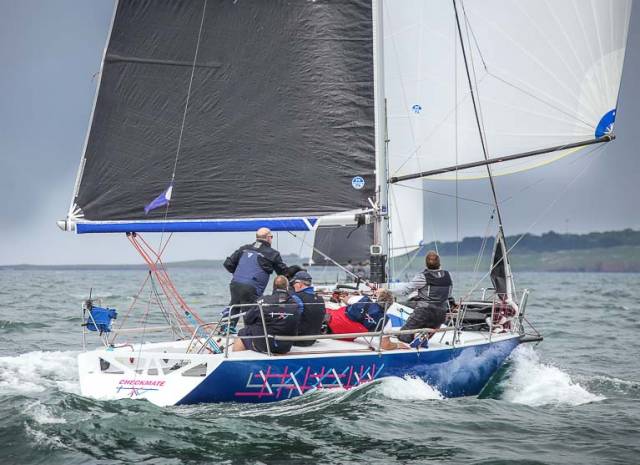 Dave Cullen’s Classic Half Tonner Checkmate XV, Howth Wave Regatta champion, will now be defending her title in September. Photo: Afloat.ie/David O’Brien
Dave Cullen’s Classic Half Tonner Checkmate XV, Howth Wave Regatta champion, will now be defending her title in September. Photo: Afloat.ie/David O’Brien
In World War 2 from 1939 to 1945, the Irish Free State was neutral, and sailing continued whenever possible in a narrow coastal strip, for in the complete absence of private motoring, there was energy available for it. Then too, many who were serving in the Allied Forces came home with enthusiasm when on leave to sail as much as possible. As for Northern Ireland, recreational sailing was banned only in 1940 – with Belfast’s vast industrial resources switched over to war production, many people were in reserved occupations rather than on active service, and the Government decided that being able to take part in sport if at all possible was useful for their health and dedication to the war effort, so limited sailing was permitted.
An interesting angle was that the neutrality of Sweden was scrupulously upheld by World War 2’s international combatants, and as the clouds of war finally receded, it was revealed that sailing had been going merrily along in the Swedish summers for the duration, and some interesting boat and rig design developments had emerged as a result.
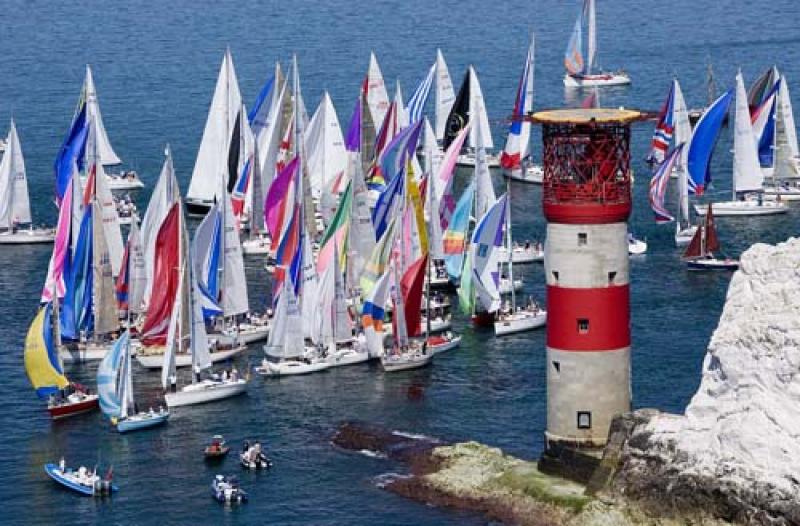 Not really maintaining the safe distance……the fleet in the annual Round the Island Race clustering at the Needles on the Isle of Wight, 2020’s race has now been postponed to September
Not really maintaining the safe distance……the fleet in the annual Round the Island Race clustering at the Needles on the Isle of Wight, 2020’s race has now been postponed to September
While it may be stretching it to compare the effects of almost total war to the disruption of a pandemic, there’s no escaping the fact that the Spanish flu of 1919 actually killed more than all of World War 1. Yet in looking at recent instances of social disruption, we desperately seek some guidance as to how things might be managed in the weeks and months ahead.
The foot-and-mouth epidemic of 2001 saw Ireland north and south kept safely isolated from disease-ridden Britain at a time when agriculture was rated as extremely important in the Irish economy, so the closing down of just about everything else was accepted as the only way to go. But among the casualties was what had promised to be the biggest ever Irish Boat Show in Dublin in March 2001, and who knows how much that contributed to the inexorable movement towards today’s Irish Boat shows being in effect in Dusseldorf, Paris and Southampton.
Then back in the first half of 1970, we had a total bank strike in Ireland for six months. Nowadays when there’s a failure of the banking system for even half a day, chaos soon breaks out. Yet fifty years ago, everyone quickly got used to it, other arrangements were made, and though when it finally ended the gently whirring sound made by bouncing cheques went on for some time, the conclusion of the experts was that the unexpected investment of unregulated funds into the financial system had been good for the Irish economy.
Who knows, but maybe it was an early experiment in helicopter money. Before that, perhaps most bizarrely of all, Ireland was cut off by a seven weeks seamen’s strike in May, June and July of 1966. In that remote era before universal air travel, it meant there wasn’t a tourist about the place, and in making a cruise to West Cork from Belfast Lough in the old 9-ton yawl Ainmara in June, it was like visiting a ghost coast.
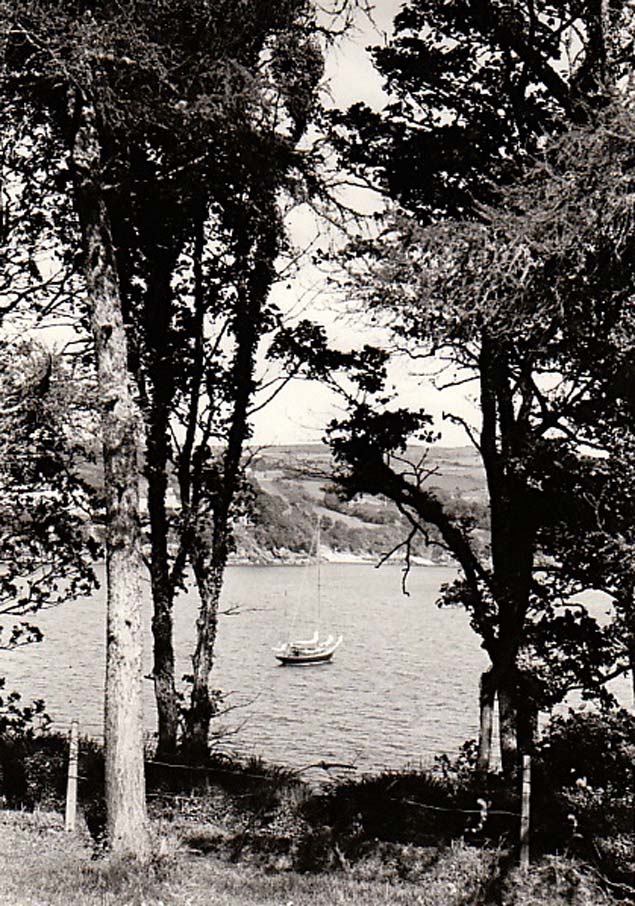 Cruising the ghost coast – Ainmara in Glandore in June 1966, when a seven-week seamen’s strike meant there were no visitors ashore, and it was still early in the season for most other cruising boats. Photo: W M Nixon
Cruising the ghost coast – Ainmara in Glandore in June 1966, when a seven-week seamen’s strike meant there were no visitors ashore, and it was still early in the season for most other cruising boats. Photo: W M Nixon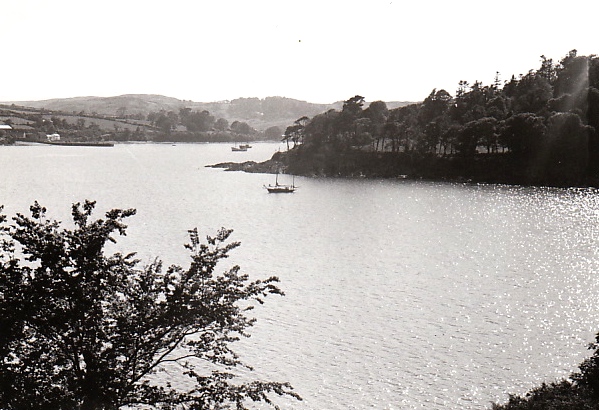 The past is a different country….Ainmara in solitary splendour in Glandore, June 1966. Photo: W M Nixon
The past is a different country….Ainmara in solitary splendour in Glandore, June 1966. Photo: W M Nixon
Admittedly West Cork wasn’t the trendy place it is nowadays, but as we were absolutely the only boat in the anchorage at Glandore, our every movement was watched, and when we came ashore in the dinghy and strolled up the road above the harbour, the two pubs opened their doors for business as we approached, and then closed again as we moved on. Service was instant and friendly, and when we sailed on to Castlehaven, getting a table for supper in Mary Anne’s in Castletownshend took no more than a nano-second.
Heaven only knows what stories will emerge at the end from the Covid-19 experience, and many of them won’t be happy ones, but meanwhile, people are coping as best they can. Here in Howth we’re in a port which has been described as the sort of place where you’ll see someone in sailing gear mowing their mini-lawn in an awful hurry before going down to race the boat. But in these changed times, the word is that the more switched on - having provided themselves with tiny minimum-maintenance ornamental gardens at home - have now secured allotments to see the summer through in growing their own vegetables and re-communing with nature for some much-needed assurance.
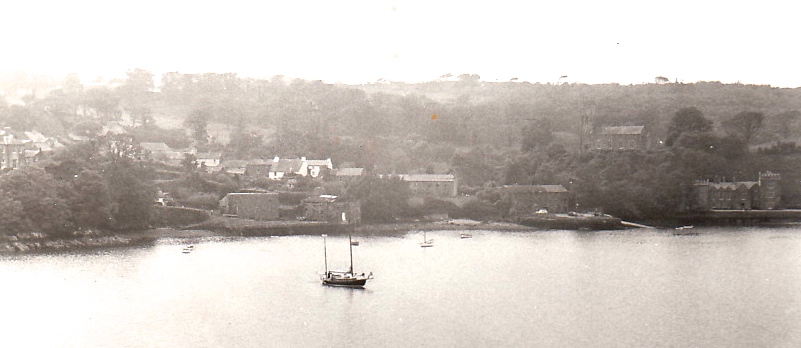 A world in suspended animation, thanks to a seven-week seamen’s strike. Ainmara anchored off a deserted Castletownshend in June 1966. Photo: W M Nixon
A world in suspended animation, thanks to a seven-week seamen’s strike. Ainmara anchored off a deserted Castletownshend in June 1966. Photo: W M Nixon
As for this business of working from home, as I’ve always done it I have to confess to a sense of a strange new unease, as Skype is – well, it’s skyping along, and this isn’t good news at all. It’s an intrusion into the profound privacy of one’s innermost sanctum, which in my case is a classic example of Rat’s Nest Chic. And you even have to think about what you might be wearing, and how you look generally.
This is an accepted matter of special concern in Finland, where working from home is highly developed and has its own etiquette. It can involve being in a very relaxed frame of mind, and they even have a special word for it. They call it kalsarikanit. Basically, it means remaining in your pyjamas or underwear throughout the day, while expecting to consume a beer or two along with the work. With Finland often being held up as the ideal way to organise a society to suit the modern world, we may be hearing more of kalsarikanet……
A bumper 2020 Cork Week Regatta planned for July to celebrate Royal Cork Yacht Club's 300th birthday has been cancelled over the Covid-19 emergency.
All events scheduled in July for the Cork300 events series, which were to run across Cork Harbour to celebrate the Royal Cork Yacht Clubs 300th birthday, have been cancelled but RCYC are continuing planning now for August events.
The Club announced today that they took this difficult decision in conjunction with their partners to safeguard the health of sailors, visitors, volunteers and the community at large and to give certainty to those participants and visitors who had scheduled to come to Cork in July.
The celebrations scheduled to take place in July, which have now been cancelled, include Volvo Cork Week 2020 (in partnership with Johnson & Perrott), a Classic Yacht Regatta, a Cruise in Company with the Irish Cruising Club and other leading Cruising Clubs from America and Europe along the Wild Atlantic Way and a Royal Cork Fleet review and National and European yacht racing championships.
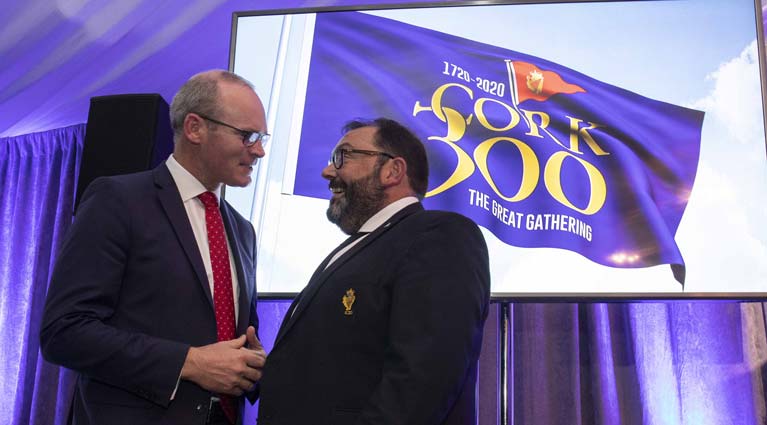 Tanaiste Simon Coveney (left) with Royal Cork Admiral Colin Morehead at the launch of Cork Week 2020 last September
Tanaiste Simon Coveney (left) with Royal Cork Admiral Colin Morehead at the launch of Cork Week 2020 last September
The Royal Cork are monitoring the ongoing Covid19 situation closely, but as of now, are continuing to plan for all of the remaining events scheduled from 1st August to end of December 2020.
Founded in 1720, the Royal Cork Yacht Club is the oldest yacht club in the world. As such, their special anniversary events were attracting National and International sailing communities to Cork from as far as Australia, Hong Kong and San Francisco who wanted to see “Where It All Began”.
Commenting, Chair of Cork300 and Admiral of the Royal Cork Yacht Club, Colin Morehead said, “It is with considerable regret and sadness that we have to cancel Volvo Cork Week 2020 and all other events throughout July. We are living in very uncertain times and the health of our members, our visitors, our city and country is now the main priority.”
“Over the last number of weeks, we have carefully monitored the developing global situation. We have taken continued guidance from Government Officials, the Health Service Executive, Irish Sailing and other experts in the hope that we would be able to proceed with our exciting schedule of events for July. We are very conscious that this decision will impact many visitors who have already booked to travel and participate and hope that making our decision at this stage will enable them to change their plans accordingly.”
"in the three hundred years since the foundation of the Royal Cork Yacht Club, we have faced many adversities"
“We are also very aware that this will be another blow to our local economy. However, in the three hundred years since the foundation of the Royal Cork Yacht Club, we have faced many adversities and are confident that working together, we will see the club, county, country and global sailing community come through these difficult times. Indeed we look forward to welcoming as many sailors as possible back to Cork Week in July 2022 ”
“I would like to thank our partners for their unwavering support – AIB (premier partner), Volvo Car Ireland (Cork Week title sponsor and Cork300 partner) our Foundation Partners the Port of Cork and Cork County Council and other Cork300 partners, Cork City Council, Heineken, Musto, Dubarry, and Doyle Shipping Group. Their support in recent weeks has been incredible. And to the voluntary committee and staff at the Royal Cork Yacht Club, along with supporting associations and clubs such as ICRA, RORC, Yacht Club de Monaco, Royal Yacht Squadron, Irish Cruising Association, Cruising Club of America and the Royal Cruising Club who have worked tirelessly over the past months and years to plan for the July events – my thanks.”
“Finally can I say that words cannot describe how thankful we all are for the hard work of everyone who is making significant sacrifices to keep us safe in these unprecedented times and to the sailing community, family and friends for your support as we navigate this uncertainty together – we truly value you, our community, more than ever.”
Also commenting, David Thomas, Managing Director Volvo Car Ireland said “Volvo Car Ireland are very proud of our long and successful association with Volvo Cork Week but fully support this difficult decision as being right for Cork, Ireland and the wider international sailing community. We hope that some of the planned events later in the year will still take place and will work closely with the Cork300 team and the Royal Cork Yacht Club around these future plans.”
"The ICRA board are now investigating the possibility of moving the 2020 National Championships"
Richard Colwell, ICRA Commodore commented, “ICRA fully support the RCYC team in their decision to cancel Volvo Cork Week incorporating the ICRA National Championships. It is a real shame that this hotly anticipated sailing event has fallen foul of the Coronavirus outbreak, but we fully understand the need to cancel, and we send our commiserations to the organising committee who have put so much hard work into an event that will not now run. The ICRA board are now investigating the possibility of moving the 2020 National Championships, to form part of an event which may still hopefully be held later in the year, and will announce more on this in the coming week.”
Royal Cork's Peter and Robert O'Leary, Ireland's sole entry in the lead the sixty-five boat Star Class fleet have slipped back to sixth overall after scoring 18th in race three at the halfway stage of the 93rd Bacardi Cup in Miami, USA.
The change in wind pressure gave no change in performance from the series leaders Mateusz Kusznierewicz (POL) and Bruno Prada (BRA) who racked up another win.
The weather conditions served up an altogether different race track on day 3, with the light and unsettled breeze postponing the start until 1330 hours. An initial wait ashore in the environs of the beautiful Coral Reef Yacht Club was followed by an on-water postponement, before the light and very warm southerly breeze filled in.
The reigning Star Class World Champions, Mateusz Kusznierewicz (POL) and Bruno Prada (BRA), repeated and improved on yesterday’s race track domination, this time breaking away to lead the fleet from the first mark to the finish by a solid margin. The partnership dismissed the assault put up by Americans George Szabo and Guy Avellon, who delivered their best race of the series so far but had to be satisfied with a 2nd place finish and a leader board climb of five places to fifth overall.
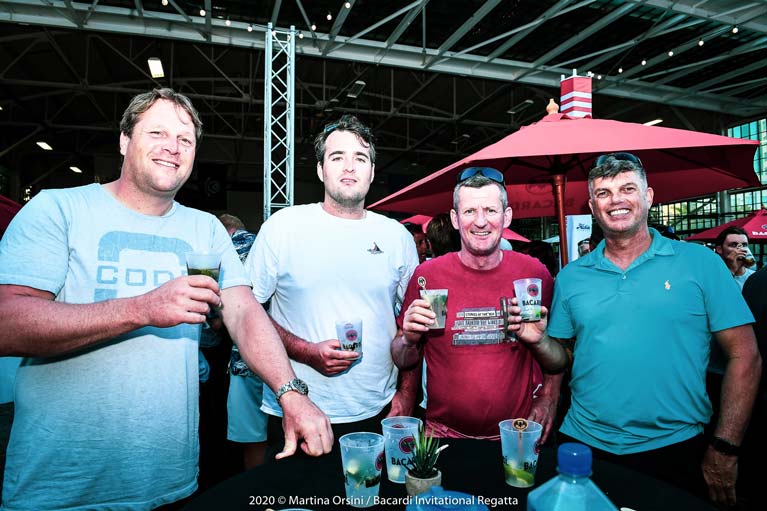 Robert O'Leary (second from left) enjoys a Bacardi with competitors at Coral Reef Yacht Club Photo: Martina Orsini
Robert O'Leary (second from left) enjoys a Bacardi with competitors at Coral Reef Yacht Club Photo: Martina Orsini
Steadily chipping away through the fleet were Eivind Melleby (NOR) and Josh Revkin (USA), who excel in breezier racecourses but today found their mojo in the tricky breeze and improved their game from 8th at the first mark to 3rd by the finish to hold steady in second overall.
“It’s going alright but we still have a little catch up to do if we want to lead this,” reflected Eivind Melleby after racing. “When the wind comes from the south in Miami it’s quite steady and it’s hard to get it wrong, we are doing our best and are happy to be up there.”
“We are half way through the regatta,” added Josh Revkin, “and we still have three more races to move on up, which we are planning to do by winning as many of these as possible.”
Whilst the pair has the series leaders well in sight, with the series discard kicking in after Thursday’s race 4, there will be numerous other teams who will work their way up the leader board and edge closer to the podium slots.
Claiming a 3rd place finish and moving up one place to third in the overall standings were the 2019 Star World silver medallists Augie Diaz (USA) and Henry Boening (BRA). The partnership executed yet another immaculate race, always holding their position in the leading pack to be one of only three teams carrying a scorecard of top 10 finishes. Diaz knows Biscayne Bay and its winds and currents better than anyone else in the fleet, and is mission focused to lift not only the Grand Master title but the iconic Bacardi Cup Trophy come Saturday 7 March.
The 2018 Bacardi Cup winner Diego Negri (ITA) racing with 2014 Star World Champion crew Frithjof Kleen (GER), secured another solid finish, staking a 6th place to sit in fourth overall. Six points behind are the winners of the first race, the Irish brothers Peter and Robert O’Leary, with the legendary Paul Cayard (USA) and his 2018 Star Sailors League Finals winner Pedro Trouche (BRA) in seventh.
From Thursday 5 March to Saturday 7 March the Star Class will be joined by the full line-up of classes at the Bacardi Invitational Regatta with the J70, Melges 24, Viper 640, VXOne sports boat and the foiling AV8 and Windfoil sailors joining the event. Tonight their regatta kicks off with the welcome party at Shake a Leg Miami, host of the Bacardi Invitational Regatta village.
Provisional Top 10 – After 3 Races
1. Mateusz Kusznierewicz/Bruno Prada (POL 8548) - 4 pts
2. Eivind Melleby/Joshua Revkin (NOR 8234) - 10 pts
3. Augie Diaz/Henry Boening (USA 8509) - 14 pts
4. Diego Negri/Frithjof Kleen (ITA 8533) - 17 pts
5. George Szabo/Guy Avellon (USA 8129) - 20 pts
6. Peter O'Leary/Robert O'Leary (IRL 8458) - 26 pts
7. Paul Cayard/Pedro Trouch (USA 8466) - 29 pts
8. Jørgen Schönherr/Markus Koy (DEN 8532) - 31 pts
9. Brian Ledbetter/Magnus Liljedahl (USA 8203) - 32 pts
10. Manu Hens/Joost Houweling (BEL 8379) - 38 pts
Royal Cork Yacht Club's Grand Soleil 40 Nieulargo is the latest entry into this June's SSE Renewables Round Ireland Yacht Race from Wicklow that gets underway in just over 15 weeks time.
Denis and Annamarie Murphy's well-proven Italian marque has been a force to be reckoned with on the south coast (especially in a breeze) and was the winner of RCYC's Yacht of the Year in 2018.
And it's not the first foray offshore for the Murphy family's most successful all-rounders as they were entrants in last year's Dun Laoghaire Dingle Race too.
Nieulargo brings to 34 the number of entries so far for the Round Ireland that is attracting considerable international interest this year. Wicklow organisers are aiming for a 60-boat fleet and with 15 weeks to go, and entries running typically very late there is still every chance this will be met for its 21st edition.
One of those skippers yet to declare is the weekend Class One winner of the RORC Caribbean Race. Royal Irish skipper Michael Boyd leads the race for a Volvo Car prize in this year's Race but only three points separate the top four skippers overall and the RIYC man has yet to reveal his boat of choice for the 700-miler.
Royal Cork Yacht Club Launches Cork Week 2020 Regatta
The Royal Cork Yacht Club, the oldest yacht club in the world, has officially launched its prestigious Volvo Cork Week 2020 regatta, which will see hundreds of boats and thousands of yachtsmen and women from around the globe compete on the waters around Cork Harbour from July 13th – 17th.
This year’s Volvo Cork Week has extra special significance as it forms a key part of the Royal Cork Yacht Club’s historic ‘Cork300’ celebrations, marking what is the oldest yacht club in the world’s tricentenary.
The world-renowned biennial regatta is already attracting a bumper fleet of entries from all over the world including Monaco, Australia, Hong Kong and San Francisco. Famous boats already registered include the elegant 60ft gaff cutter 'Thalia'*, the competitive racing boat ‘Ran’* and the beautiful modern racing yacht ‘Tala'. The regatta is expected to book out quickly as many participants are travelling to Ireland for the tricentenary celebrations.
This year Volvo Cork Week will also incorporate The Irish Cruiser Racing Association National Championships, the IRC European Championship, the 1720 European Championships, the Beaufort Cup, a Classic Yacht regatta and the southern championships for the International Dragon Class.
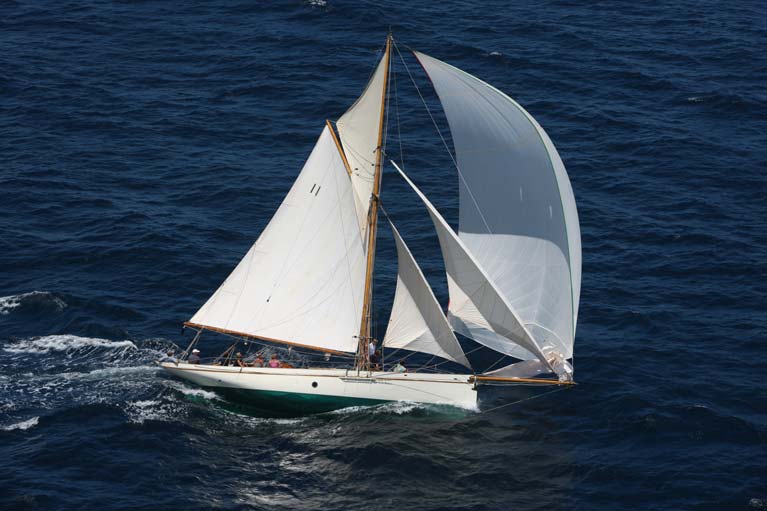 Thalia - classic yacht is coming to Cork Week
Thalia - classic yacht is coming to Cork Week
All qualifying boats entered in Volvo Cork Week 2020 will automatically be entered into the ICRA National Championships, the pinnacle of the Irish inshore cruiser racing calendar which will see the Irish National Champion declared.
Volvo Cork Week has historically been regarded as a ‘must-do’ regatta on the international sailing calendar due to its unparalleled reputation for exhilarating competitive racing over a variety of race courses in fair sailing waters and its incredible line-up of post-racing off the water entertainment and social activity. As always, the atmosphere in Crosshaven, home of the Royal Cork Yacht Club, will be second to none both during and ahead of Volvo Cork Week 2020.
Volvo Cork Week Director of Racing, Rosscoe Deasy said: “I look forward to welcoming sailors from around the world to Cork Harbour in 2020 in celebration of the Royal Cork Yacht Club’s tri-centennial year. We have a packed schedule and the season’s centrepiece will be the renowned Volvo Cork Week in July. Notably, the 2020 regatta will also include championship events such as the IRC Europeans, the ICRA Nationals, the 1720 Europeans and the Beaufort Cup.
“Since 1978, every Cork Week has delivered a unique mix of top-notch competition afloat & top-class entertainment ashore, and next year will be no different. In fact, judging by the interest received and the stories of glory days already being retold, Volvo Cork Week 2020 will set a new standard on both counts. This event has been 300 years in the making, no sailor should miss it.”
Richard Colwell, Commodore of the Irish Cruising Racing Association said, “The ICRA is delighted to be partnering with the Royal Cork Yacht Club to hold the Irish Cruiser Racing National Championships as an integral part of Volvo Cork Week 2020. We encourage all of the cruiser racing fraternity in Ireland to travel and take part in what promises to be an exciting and competitive event, as part of Royal Cork’s broader Tricentenary celebrations. With visitors from countries all over Europe, it is important that Irish Cruiser Racing shows the strength that we have across all classes from White Sails to Cruiser 0 at the National Championships and so contribute to the competitive racing expected.”
1720 Sports Boat European Championships
A bumper fleet of more than 40 yachts from Ireland, UK, Netherlands, Spain and elsewhere around Europe is expected to compete in the 1720 Sports Boat European Championships as part of Volvo Cork Week 2020. The race committee is particularly pleased to host this European Championship event due in part to the fact that the original idea for the 1720 was conceived by a group of committed racing members of the Royal Cork Yacht Club. This distinctive class of boat also took its name from the year in which the club was founded.
Beaufort Cup
The third edition of the Beaufort Cup, the prestigious international inter-services sailing regatta, will also be hosted by the Royal Cork Yacht Club with the support of the Irish Defence Forces, during Volvo Cork Week. A specially commissioned perpetual trophy in honour of Sir Francis Beaufort, creator of the Beaufort Scale, will be presented to the overall winner of the regatta which will entail a mix of challenging offshore and tactical inshore racing, including an overnight race around the iconic Fastnet Rock and back to Cork. International teams from their associated national emergency services are invited to compete in this prestigious competition, with the proviso that 50% of each team must be active in the service they represent.
Classic Yacht Regatta
Volvo Cork Week will also host a dedicated Classic Yacht Regatta for the first time in 2020. Classic Yachts from around the globe will sail to Cork to celebrate ‘Where It All Began’ and partake in three days of racing in and outside Cork Harbour. This event will also provide a fantastic viewing spectacle for shoreline onlookers.
International Dragon Class
In addition to this, the International Dragon Class will return to Volvo Cork Week in 2020 following their very successful outing in 2018, to hold their Southern Championships in Cork.
Races to Cork:
A series of national and international races to Cork will take place in the run-up to the five-day regatta.
Morgan Cup: (Cowes England to Cork)
These include the highly prestigious Morgan Cup race – organised by the Royal Ocean Racing Club since 1958 – which will cross the Celtic Sea to Cork for the first time ever with the support of the Royal Yacht Squadron and the Royal Cork Yacht Club. This 324nm race will carry an attractive points-weighting for the 2020 RORC Season Points Championship and is expected to attract a substantial fleet. The line honours winner for this race will be the first recipient of a specially commissioned perpetual trophy graciously donated to the Royal Cork Yacht Club by His Royal Highness, the Prince of Wales, to honour the club’s tricentenary and the close relationship between the United Kingdom, Ireland and its sailing communities.
Kingstown to Queenstown Race (Dublin to Cork)
Meanwhile, the historic Kingstown to Queenstown race from Dun Laoghaire to Cobh will take place on July 9th, enhancing the build up to Volvo Cork Week 2020 with a re-enactment of what is acknowledged as the first-ever offshore race to take place in the British Isles, in 1860.
Robbe and Berking German Offshore Trophy (Heligoland Germany to Cork)
A competitive fleet will also set sail on an 800nm race from Heligoland, Germany, to Cork, Ireland, on July 4th competing for the Robbe and Berking German Offshore Trophy, arriving ahead in Ireland of the historic Volvo Cork Week 2020.
Vice-Admiral of the Royal Cork Yacht Club and Cork300 Chairman, Colin Morehead, said: “The biennial Cork Week regatta has seen many friendships and memories created since it was first held in 1978. I would encourage everyone to return to Cork Harbour next year and join us in celebrating Where It All Began by participating in Volvo Cork Week 2020 and help restore its status as Europe’s largest fun regatta.
Captain Pat Farnan of Cork Harbour is Sailor of the Month for January
Captain Pat Farnan’s retirement as Admiral of the Royal Cork YC on January 20th - after a two-year tour of duty in this top role - marked the completion of another chapter in an outstanding maritime career that took him straight from school to take up a Cadetship in Irish Shipping. After rising to the rank of Captain with wide-ranging sea service, he was recruited in 1980 into the frontline staff of the Port of Cork as Assistant Harbour Master, where his 33-year career saw a period of very extensive facilities re-location and expansion. He became for many years Harbour Master and then additionally Deputy Chief Executive, serving also as President of the European Harbour Masters Association from 1996-1998.
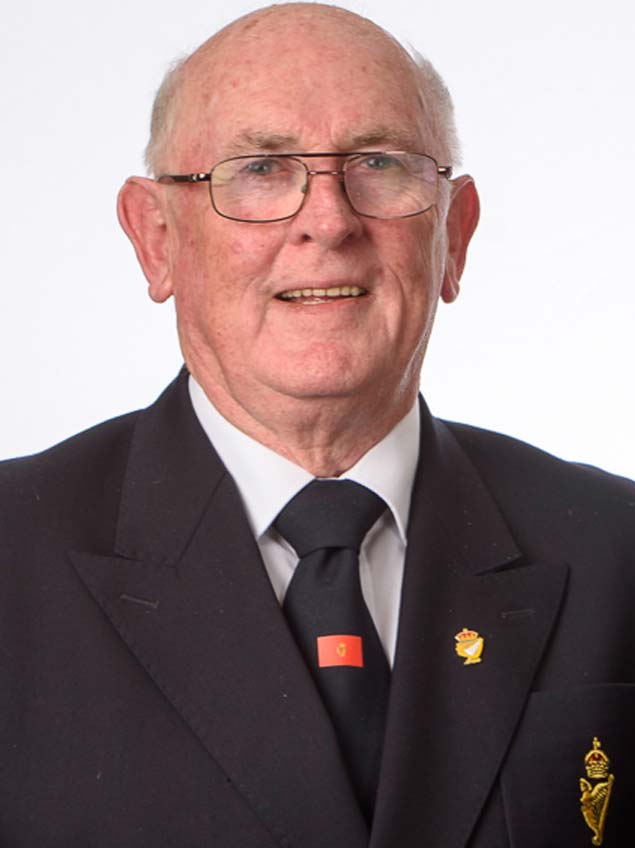 Pat Farnan who has retired as RCYC Admiral
Pat Farnan who has retired as RCYC Admiral
By the time he retired from working in the Port of Cork, his many skills and capable and reassuring presence had been called on for voluntary work in running the Royal Cork YC, for the sea was both his work and his leisure. He thus became Admiral for the demanding two year period in the countdown to the RCYC’s Tricentenary in 2020. Far from being overshadowed by the approaching celebrations, 2018 and 2019 were such busy and successful years in RCYC sailing that the Royal Cork saw 2020 being ushered in with the announcement that they were the new Mitsubishi Motors Sailing Club of the Year on the strength of outstanding achievements in 2018 and ’19.
Pat Farnan may now have more time to enjoy sailing his own cruiser. But we feel sure that his many talents could well be called on again to serve in some new capacity in the maritime world. Meanwhile, we’re honoured to confirm him as Sailor of the Month for January 2020.
Morehead Elected Royal Cork Yacht Club Admiral in Tricentenary Year
Colin Morehead has been elected as Admiral of the Royal Cork Yacht Club succeeding the outgoing Pat Farnan as the club celebrates its 300th year as the oldest yacht club in the world writes Bob Bateman. At the 299th AGM, Morehead was elected the 42nd Admiral of the Royal Cork Yacht Club. In his acceptance speech, he thanked Farnan for the manner in which he executed his role over the past two years and steered the club into its Tricentenary Year.
Morehead has been part of the Royal Cork all his life, following in the footsteps of generations of his family before him. He spoke briefly about plans for events due to take place in this tricentenary year calling out the St Patrick’s Day parade, Seafest, World Championship power racing, a classic regatta, Volvo Cork Week and no less than ten Cork300 dinghy events which will see European, National and Regional titles decided.
"Morehead has been part of the Royal Cork all his life"
The incoming Admiral also outlined his wish to develop a five-year plan for the club which he would like to see approved at the 300th AGM next year along with the development of a new sustainability plan for the club which underpins all of the club’s activities. He also set out an ambition to secure an additional European or World Championship event to be run at the club by 2023 (Recently the club announced that the 2021 World Topper Championships would take place at the Crosshaven based club).
In his closing remarks, he set out the fact that nothing could be achieved without the support and dedication of its staff and its incredible committee’s and volunteers. He reminded everyone that volunteers give of their time and services freely and they should be treated with respect and courtesy at all times by all members. He continued by saying “we should value and recognise our volunteers as a significant resource who enable us to achieve our objectives”.
He concluded by calling on all members to use the magnificent harbour we have on our doorstep to showcase the role which the Royal Cork plays in the promotion of sailing. He called on everyone to use the wonderful facilities which the clubhouse affords its members and in doing so offers us all the opportunity to rekindle existing friendships and the creation of new ones.


























